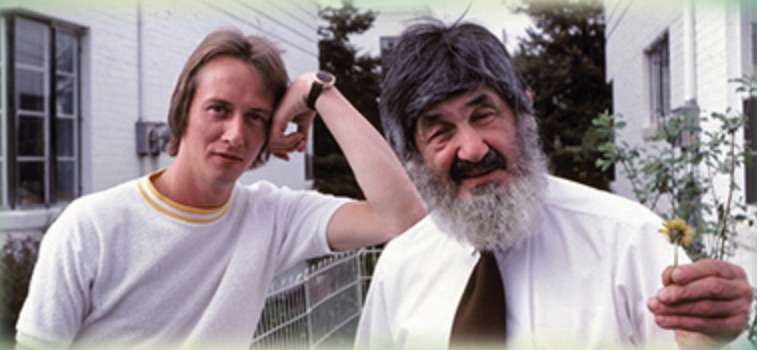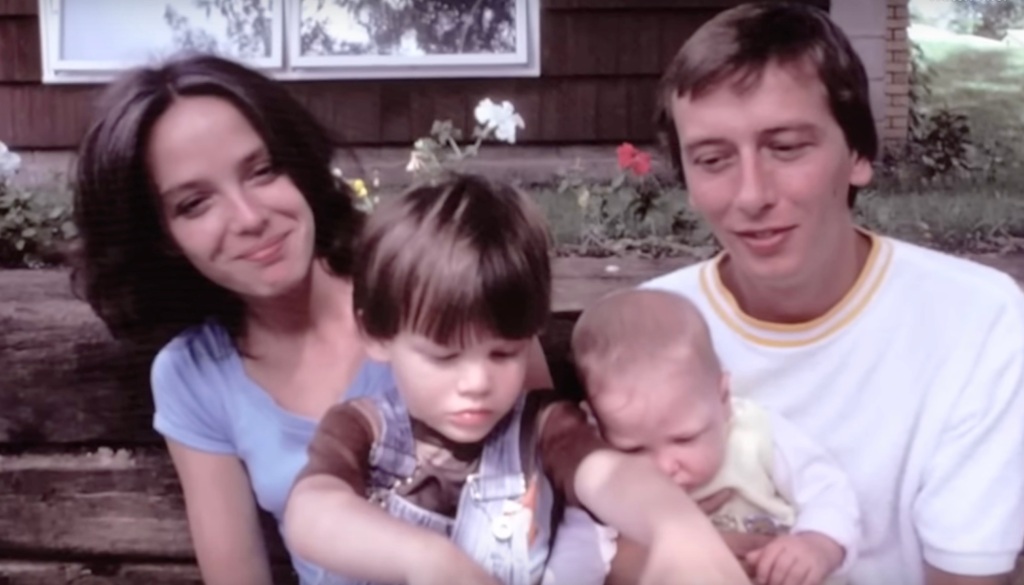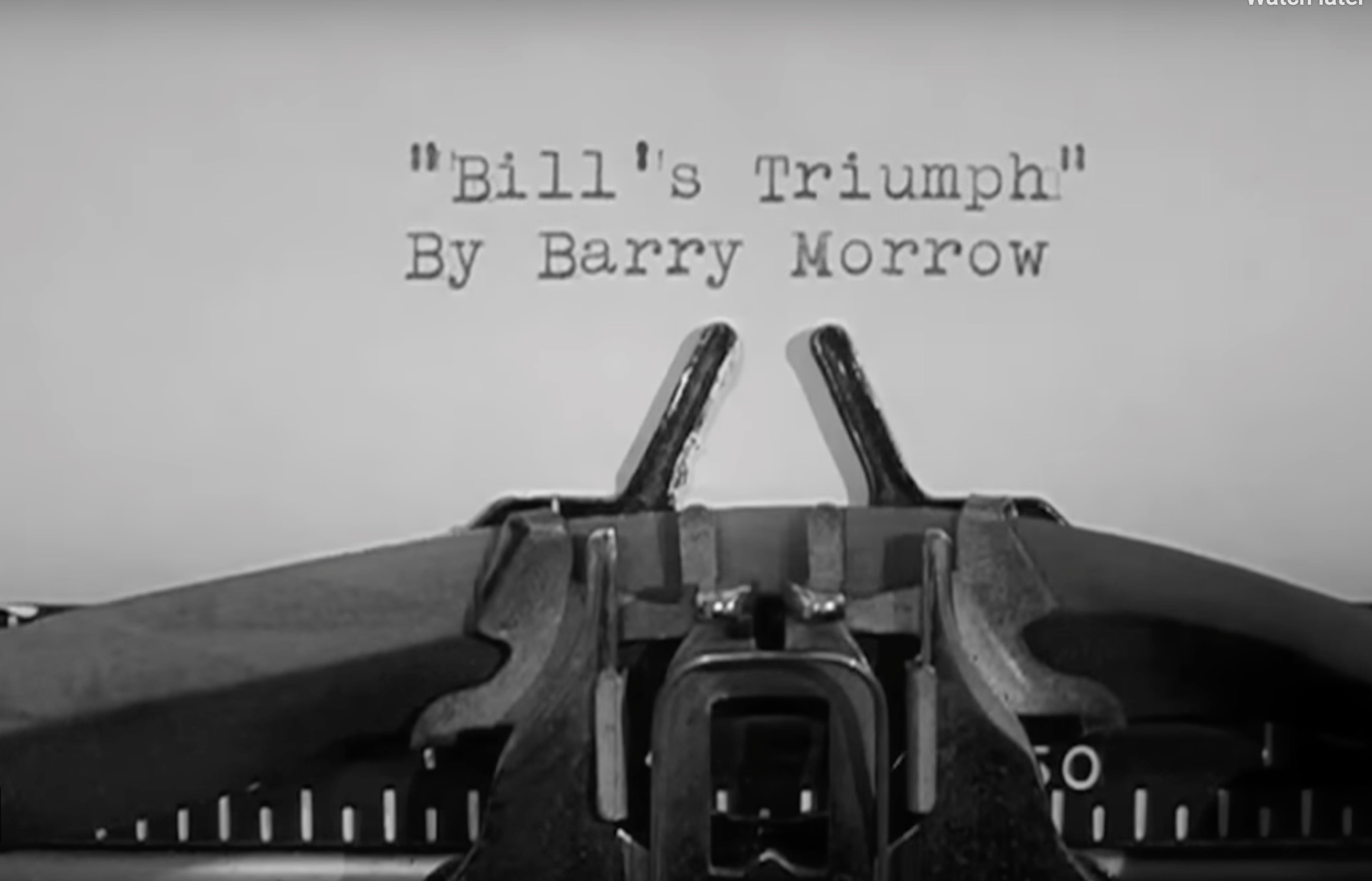
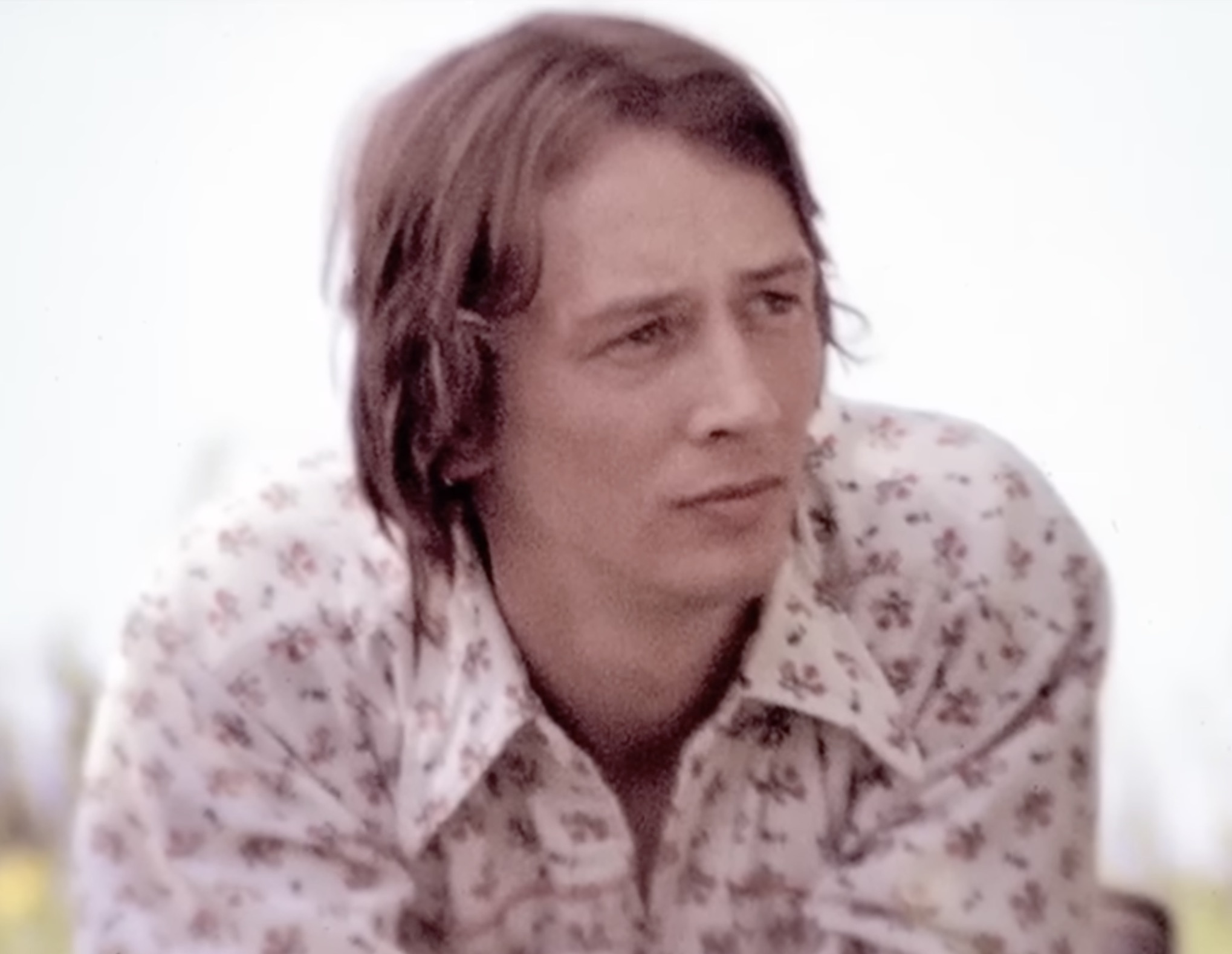
For screenwriter Barry Morrow – who worked at the University of Iowa School of Social Work for seven years (1974-1981) – what began as a selfless act of kindness with a mentally-challenged 59-year-old Minnesota man grew into a sensational Hollywood career – one that included winning an Academy Award for Screenwriting for co-writing the movie “Rain Man,” starring Dustin Hoffman and Tom Cruise. For that story, we must go back to the beginning – to Minneapolis – Christmas 1972…

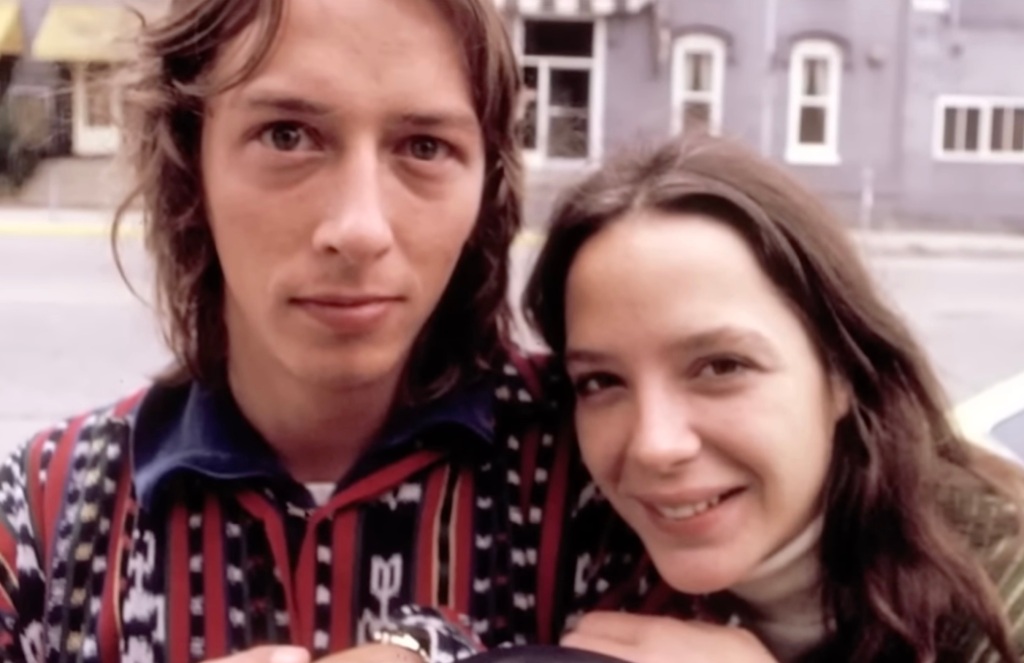
Barry Morrow (above left) was born June 12, 1948 in Austin, Minnesota, graduating from St. Olaf College in Northfield. In 1972, he and his wife, Beverly Lee McKenzie Morrow (above right), were living in Minneapolis, with Barry trying to sell encyclopedias while Bev worked as a cocktail waitress at the high-brow Minikahda Country Club (pictured below). Over a period of three months, as Barry was sitting in his car outside the club, waiting for Bev to finish up work, he would often spot a smiling figure waving to him from an upper floor window.
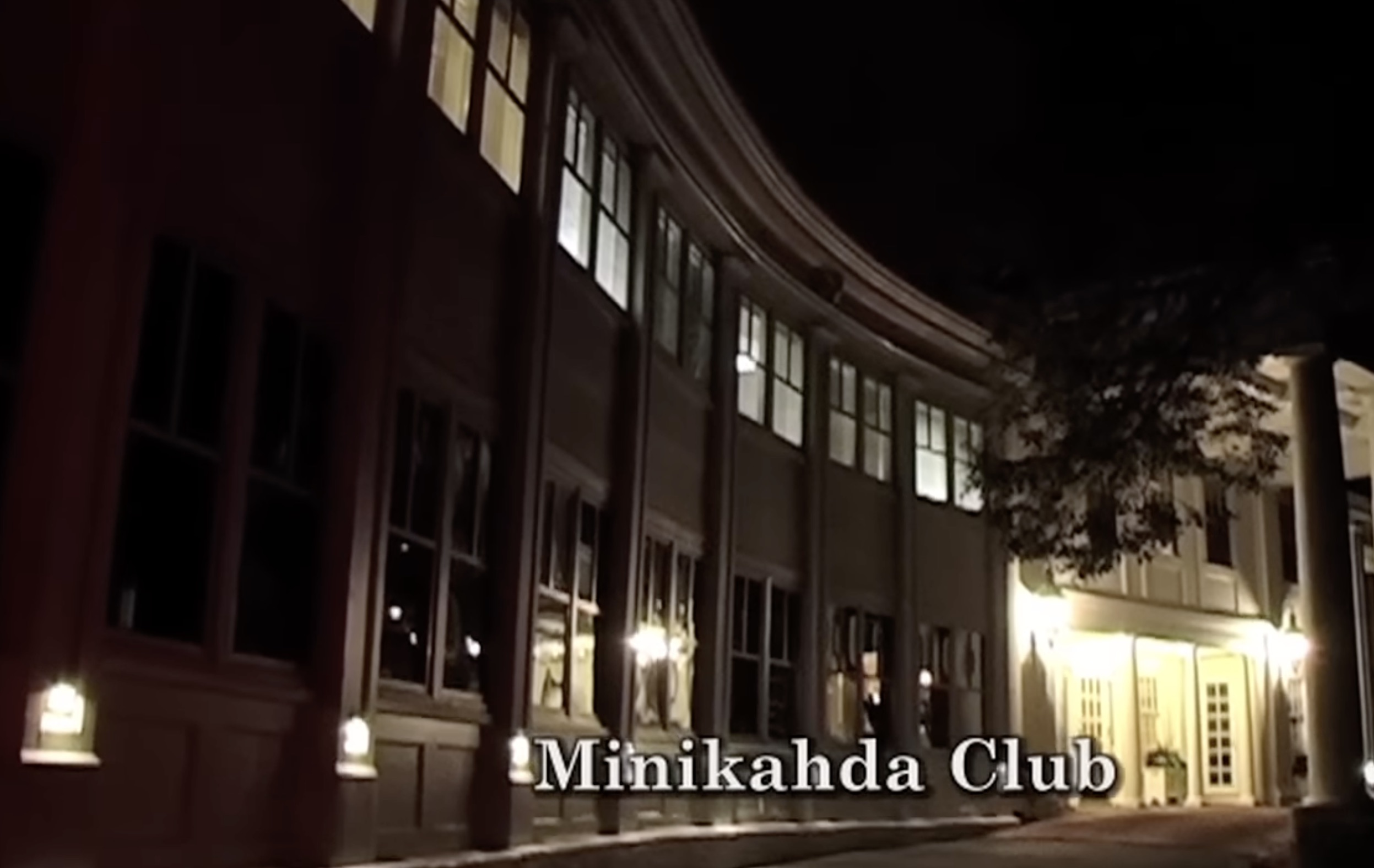
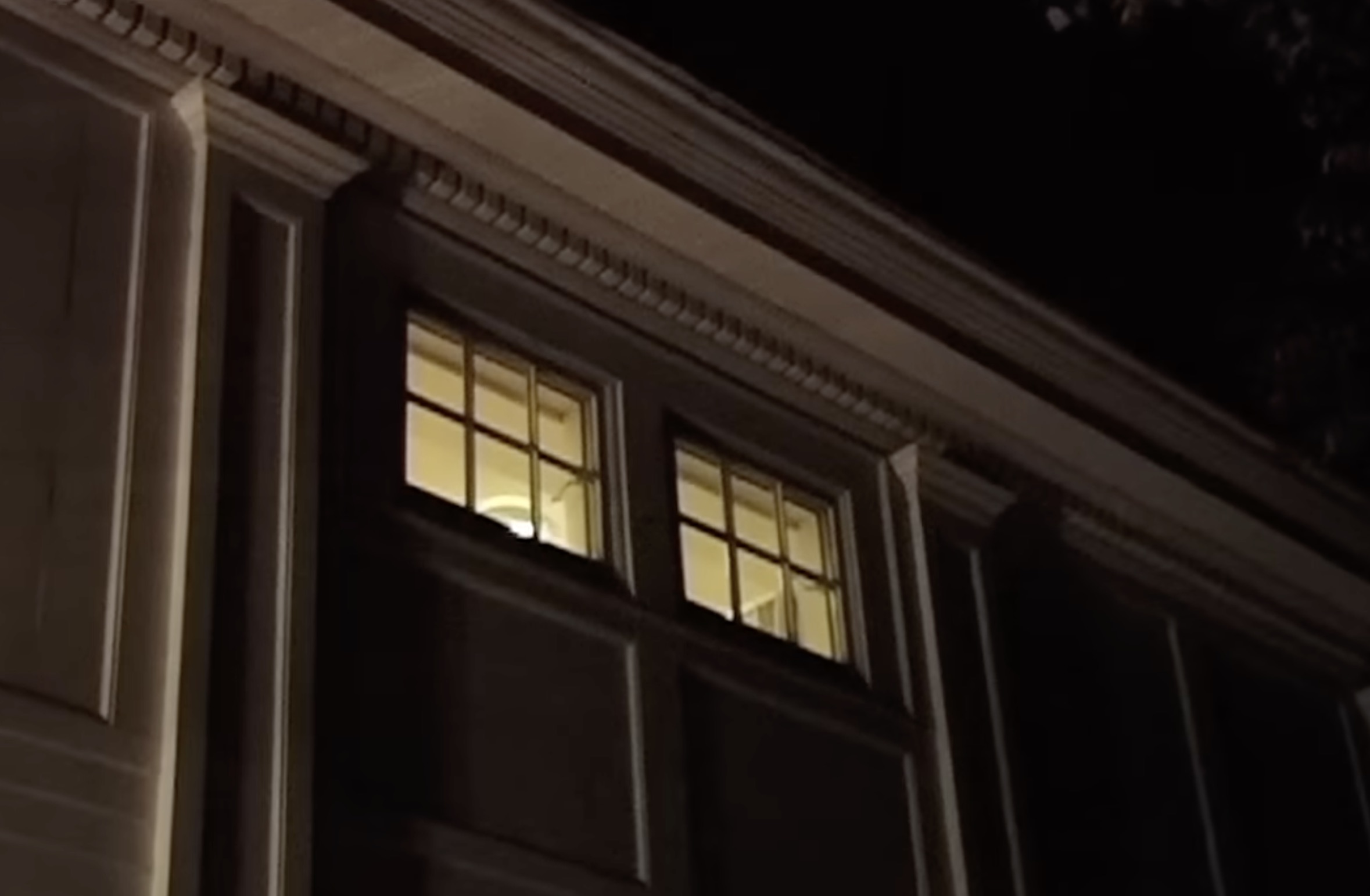

That smiling face and friendly wave from the man in the window stuck with Barry. So, in December 1972, when Bev and Barry were attending a staff Christmas party hosted at the Country Club, Morrow finally met that waving figure in the window. As it turned out, this handyman and dishwasher – Bill Sackter – had spent forty-four years (1920-1964) in a state mental Institution in Faribault, Minnesota, and had taken this pot-scrubbing job at the Country Club since he now was living at a nearby halfway house. You can read the full story here.
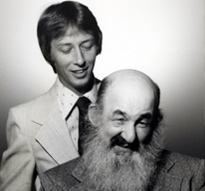
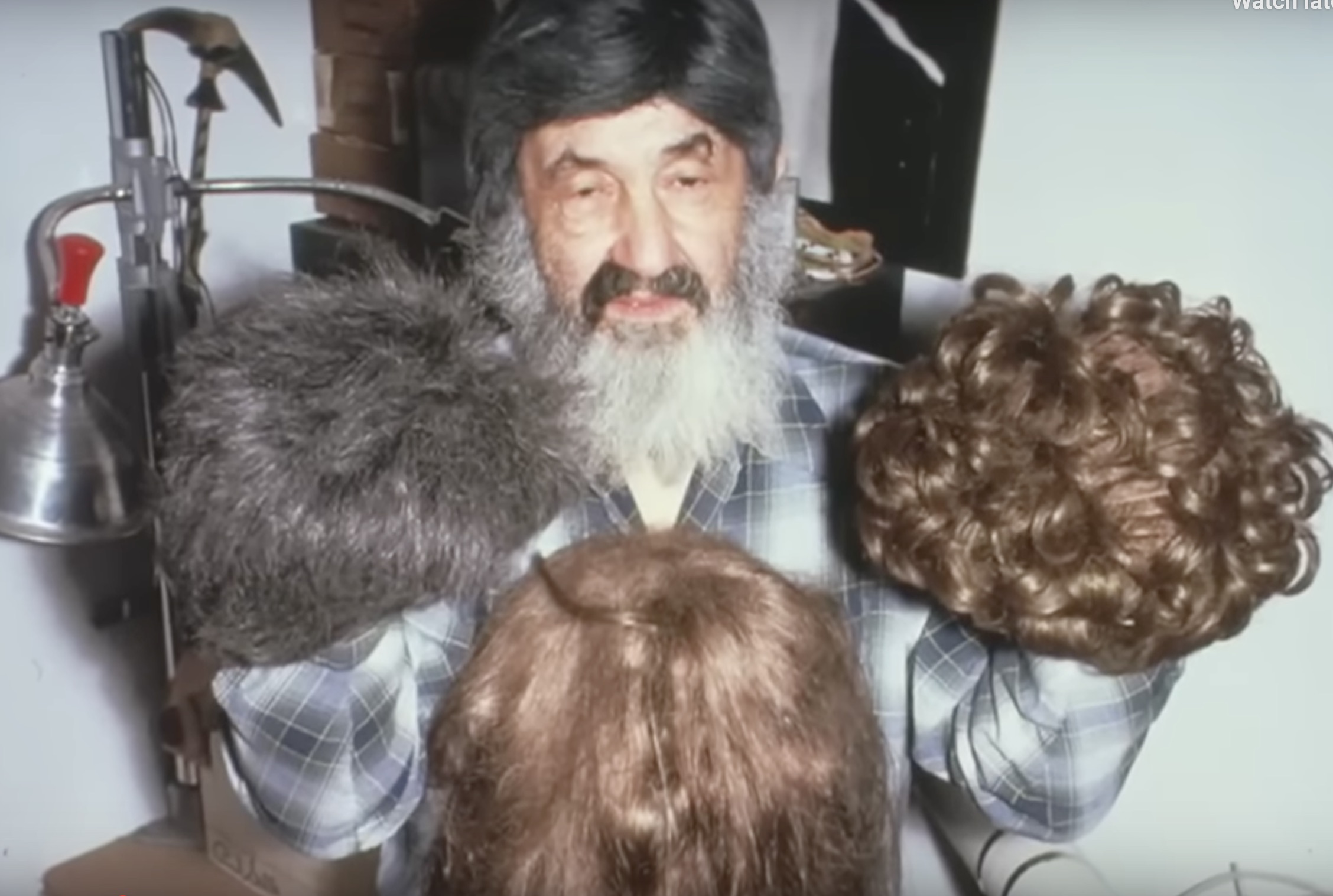
While Morrow was, at first, put off by Sackter’s outgoing personality – topped off by his outlandish wig, Barry was touched deeply by his short conversation with Bill, and the many others that followed. Thus, over the next two years, Morrow bonded deeply with Bill, coming alongside him, aiding him where he could, and inviting Sackter into every aspect of the Morrow’s home life. In truth, Bill Sackter became ‘family’ to Bev & Barry Morrow.

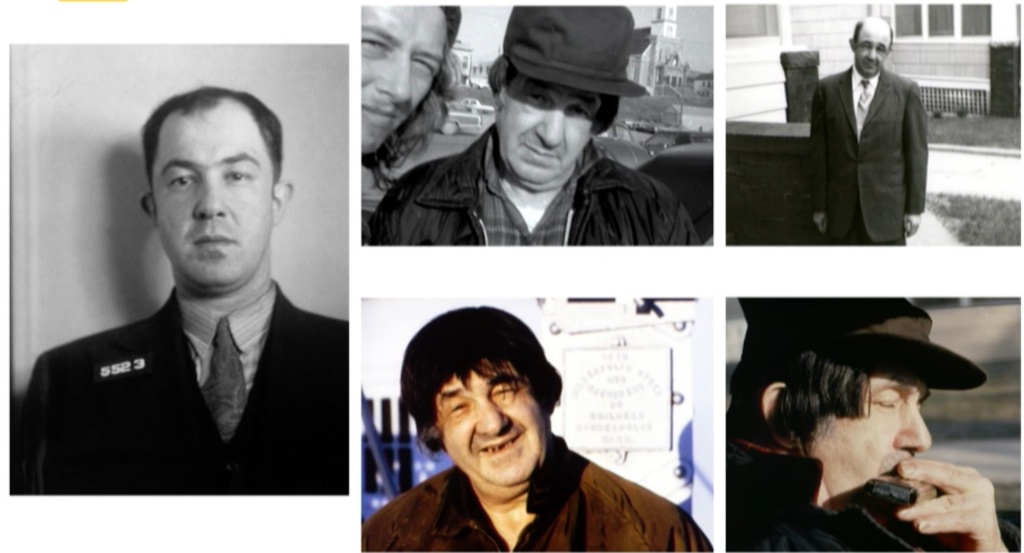
In 1974, the friendship between Barry and Bill appeared to be in trouble when the Morrows decided to move away from Minneapolis in order for Barry to pursue a new opportunity as a video editor at the University of Iowa School of Social Work. Six months later, Barry got a disturbing call from Bill’s social worker. Bill, who fell back into a deep depression after the Morrows left town, was facing a major medical emergency, and was going to be institutionalized again after he recovered from a leg amputation.
“I couldn’t let that happen,” recalls Morrow, so he packed a bag and drove the family station wagon to Minneapolis, picking up Bill and bringing him back to Iowa City. That one decision, made out of Barry’s love for his old friend, led to an eight-year journey that ultimately transformed both the life of Bill Sackter, and the future of Barry Marrow.

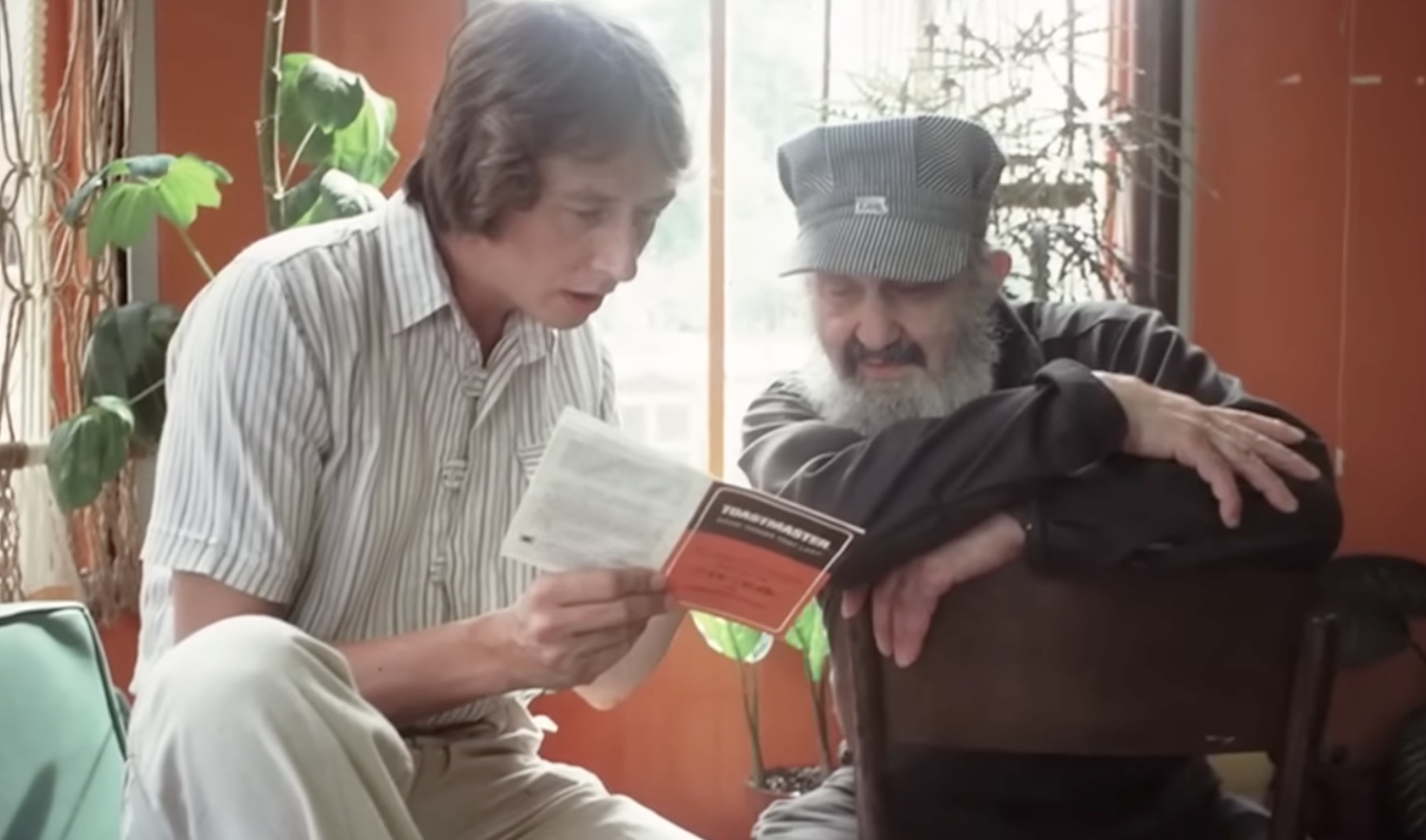
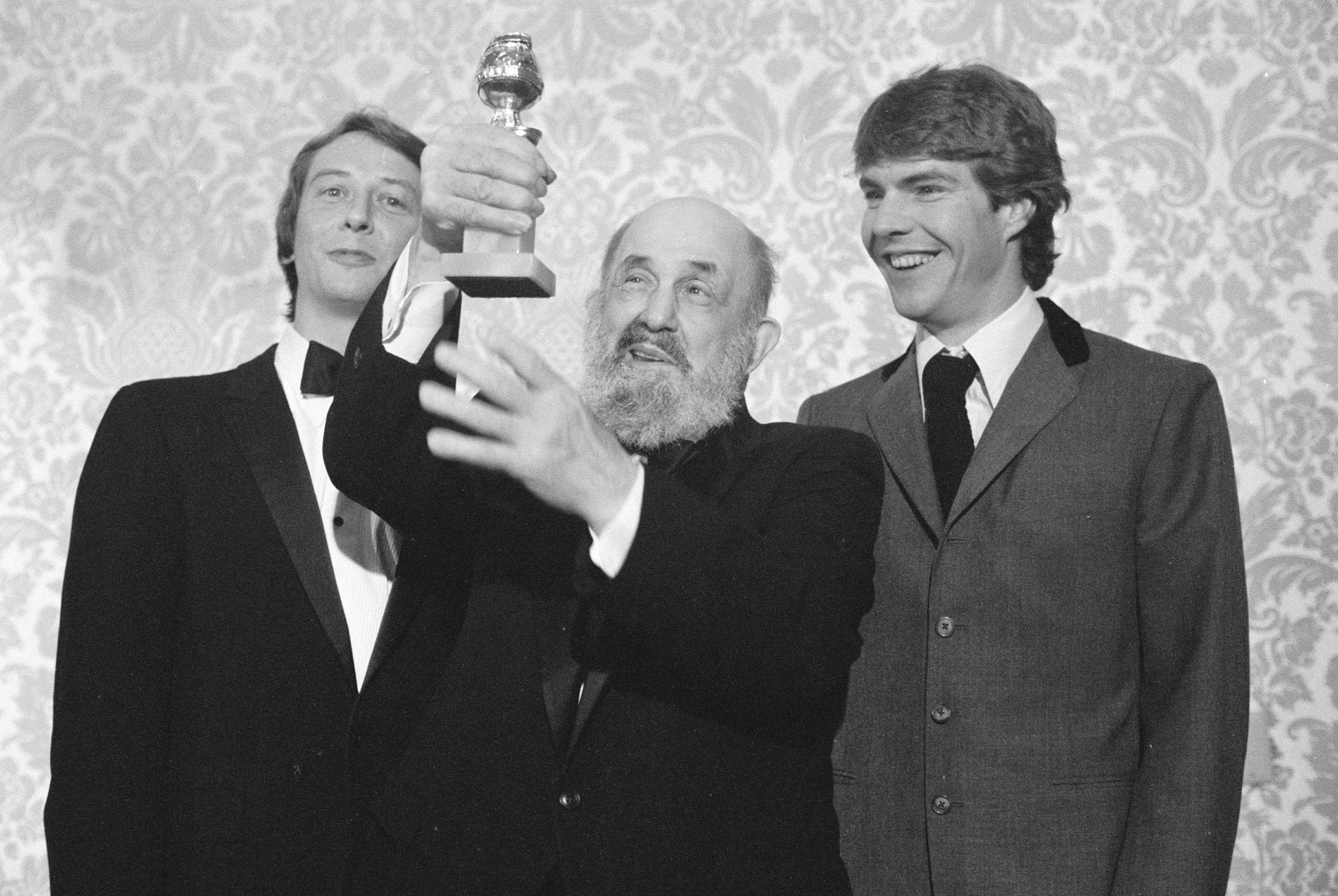
“Without Bill Sackter,” Morrow states, “there would be no career in screenwriting, no “Rain Man,” and no Academy Award.”
You see, Barry credits Bill Sackter as being the catalyst that started his screenwriting career and changed the direction of his life. “I got Bill going in the coffee business, and he got me going in the writing business,” says Morrow. “I still miss him.”
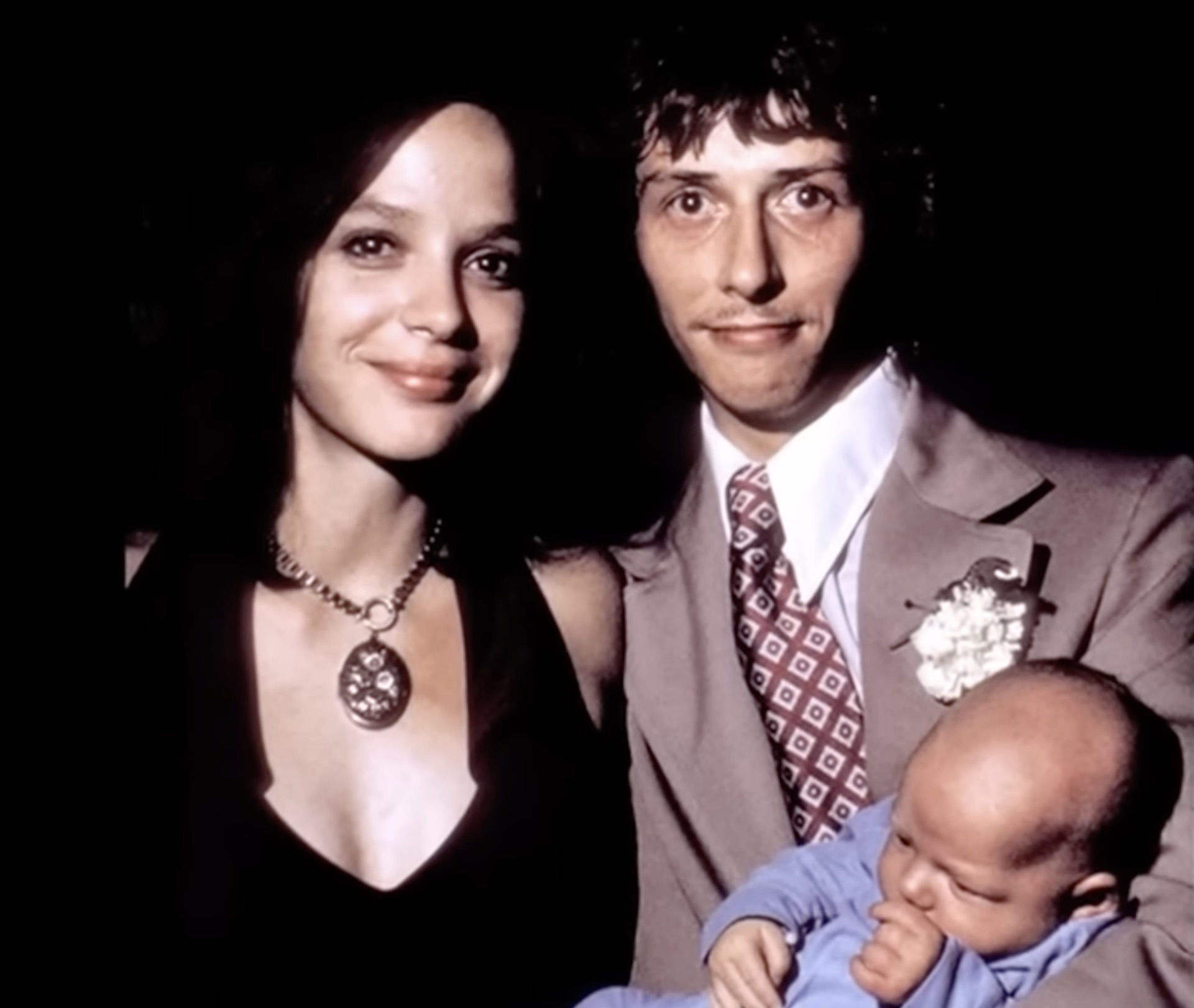
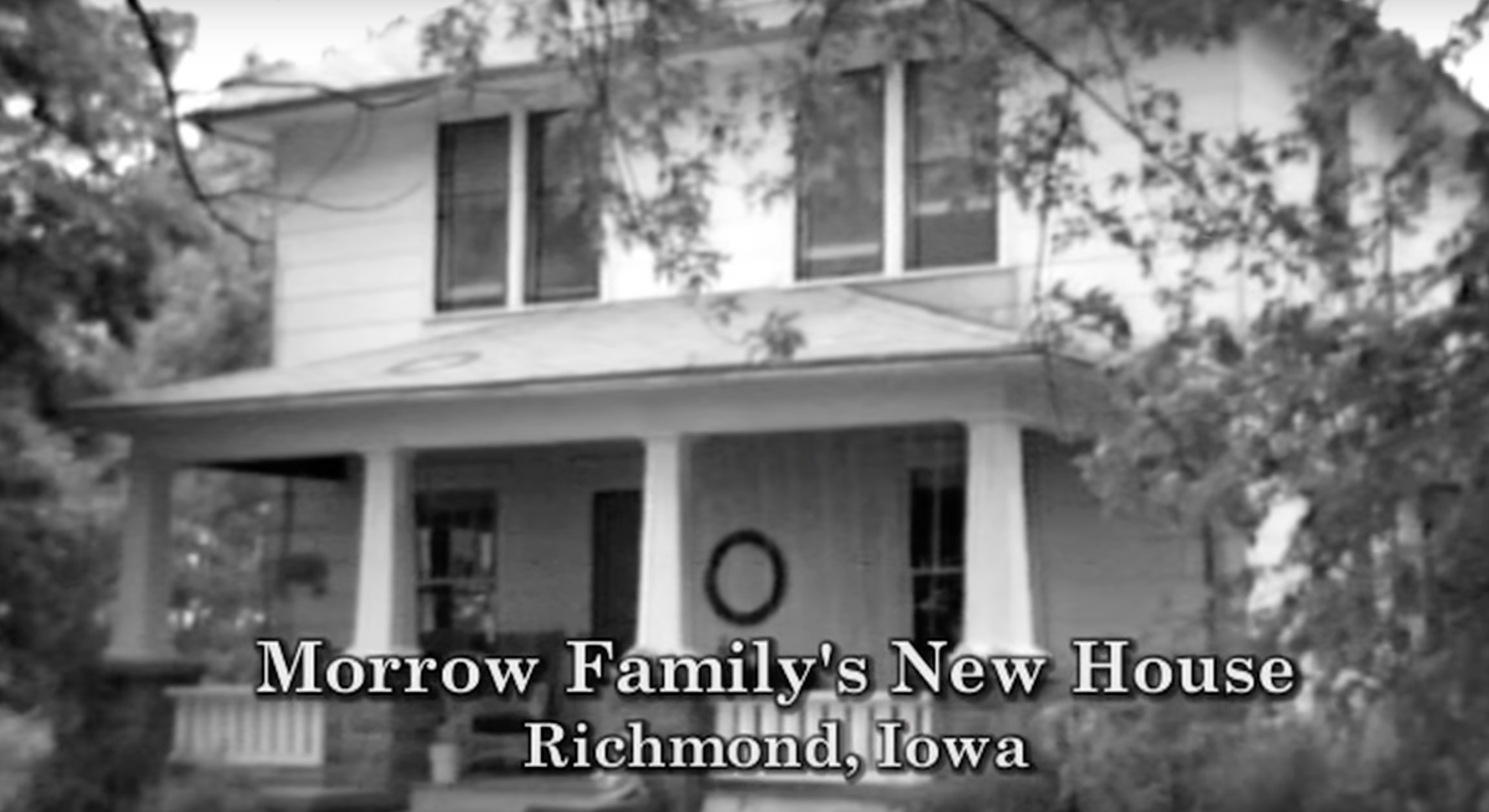
At the time (1975), Morrow and his wife and newborn son lived in a farmhouse in Richmond, just south of Iowa City. Barry became Bill’s legal guardian, finding him a room to rent in the wonderfully-warm and loving Iowa City household of Mae Driscoll, while getting him a job making coffee in the student lounge at UI’s School of Social Work. With Barry’s help, Bill learned how to ride the bus to work with his lunch box in hand, make coffee, and become the gracious and loving host of what would soon become known as Wild Bill’s Coffee Shop.
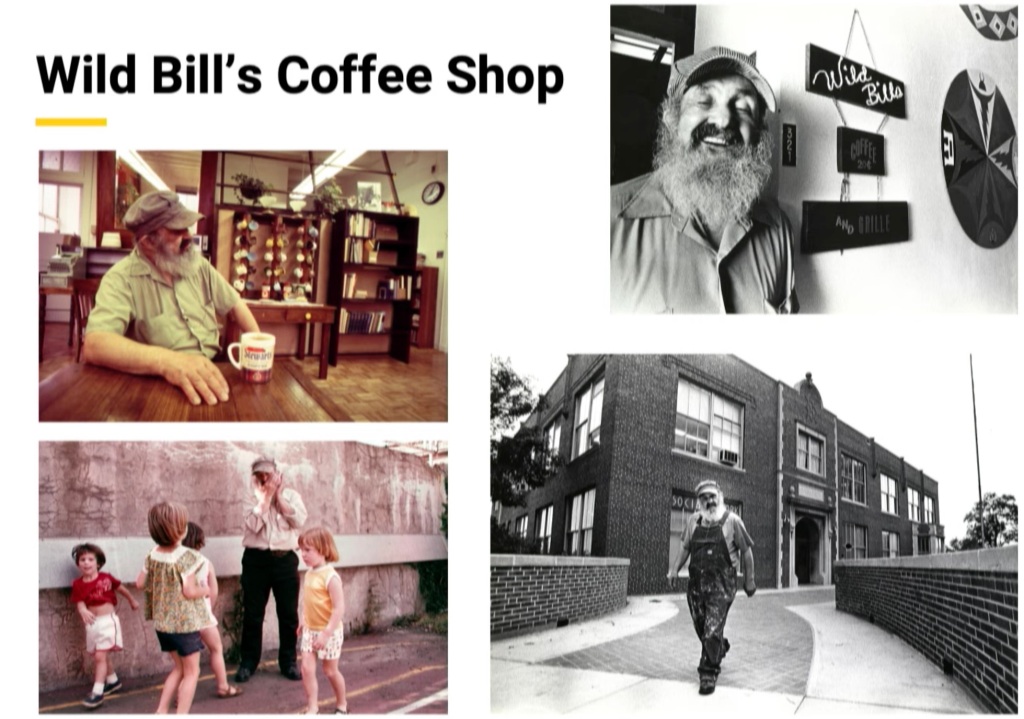
Before long, people from all over Iowa City were stopping by for java and to experience the “one-man oasis” as one customer put it — the lovable proprietor of the most popular coffee house in Iowa City. You can read the full story here.


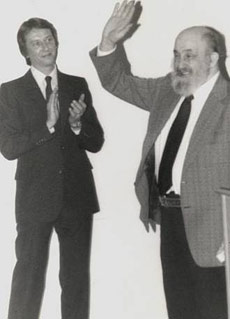
As Barry tells the story, a group of UI students from the School of Social Work became so impressed with Bill Sackter and his life-giving personality that they asked Morrow to help them fill out an application, nominating Wild Bill for the UI Handicapped Person of the Year Award. So, on a summer night in 1976, Barry sat down at his typewriter and began pouring out Bill Sackter’s story. “I wanted to make sense of it,” Barry says, so within a few days, he had a 50-page overview which he decided to call – Bill’s Triumph.

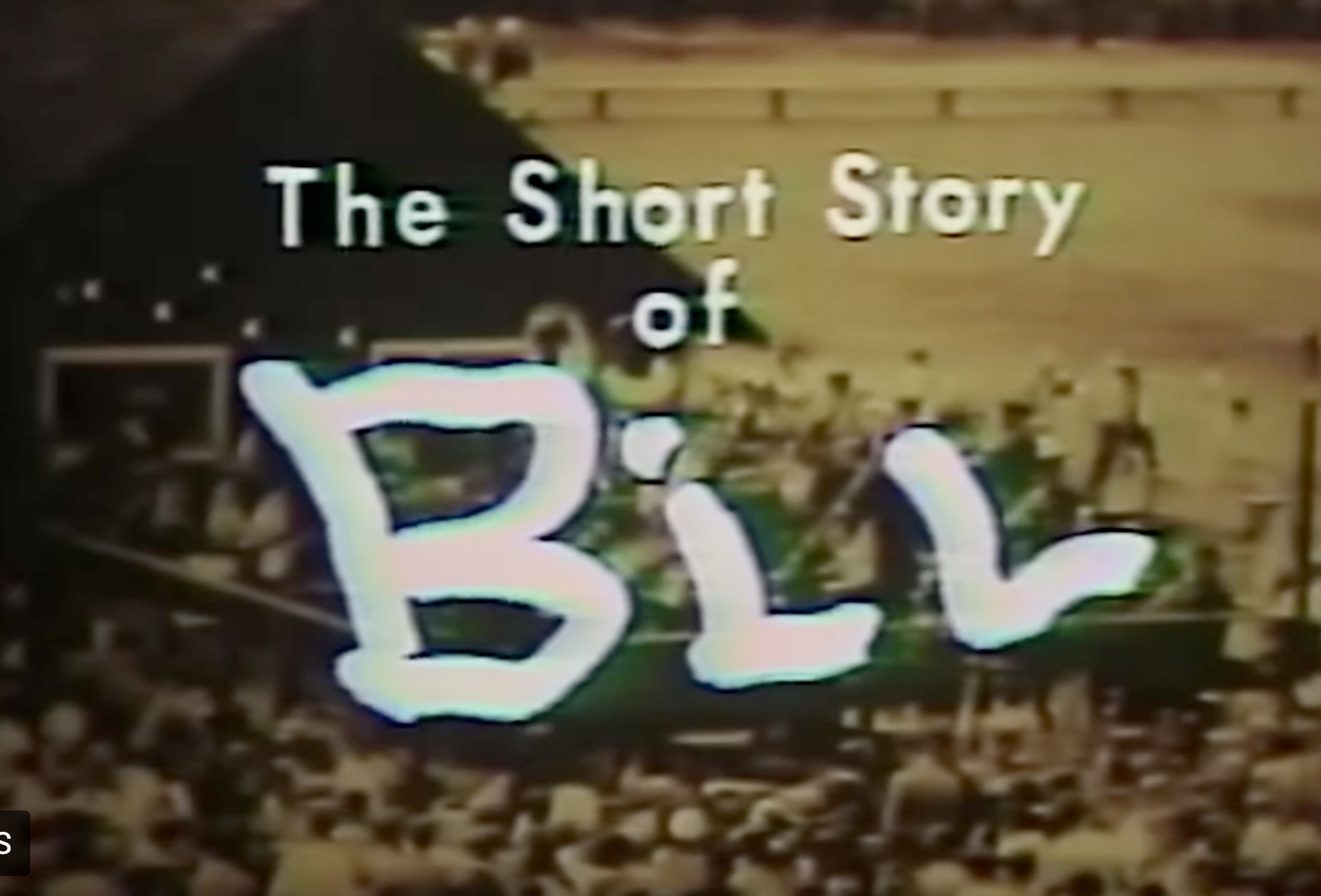
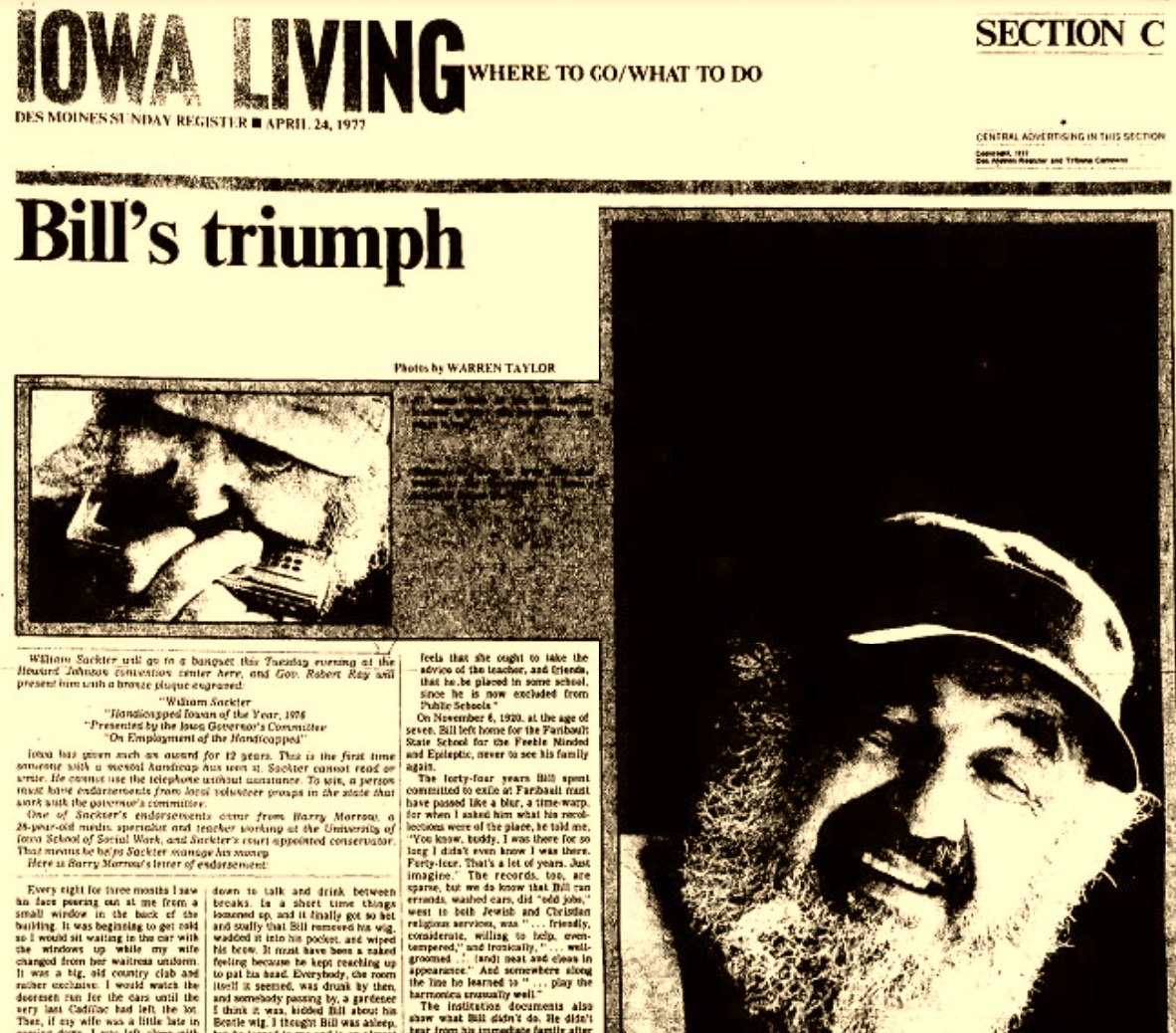
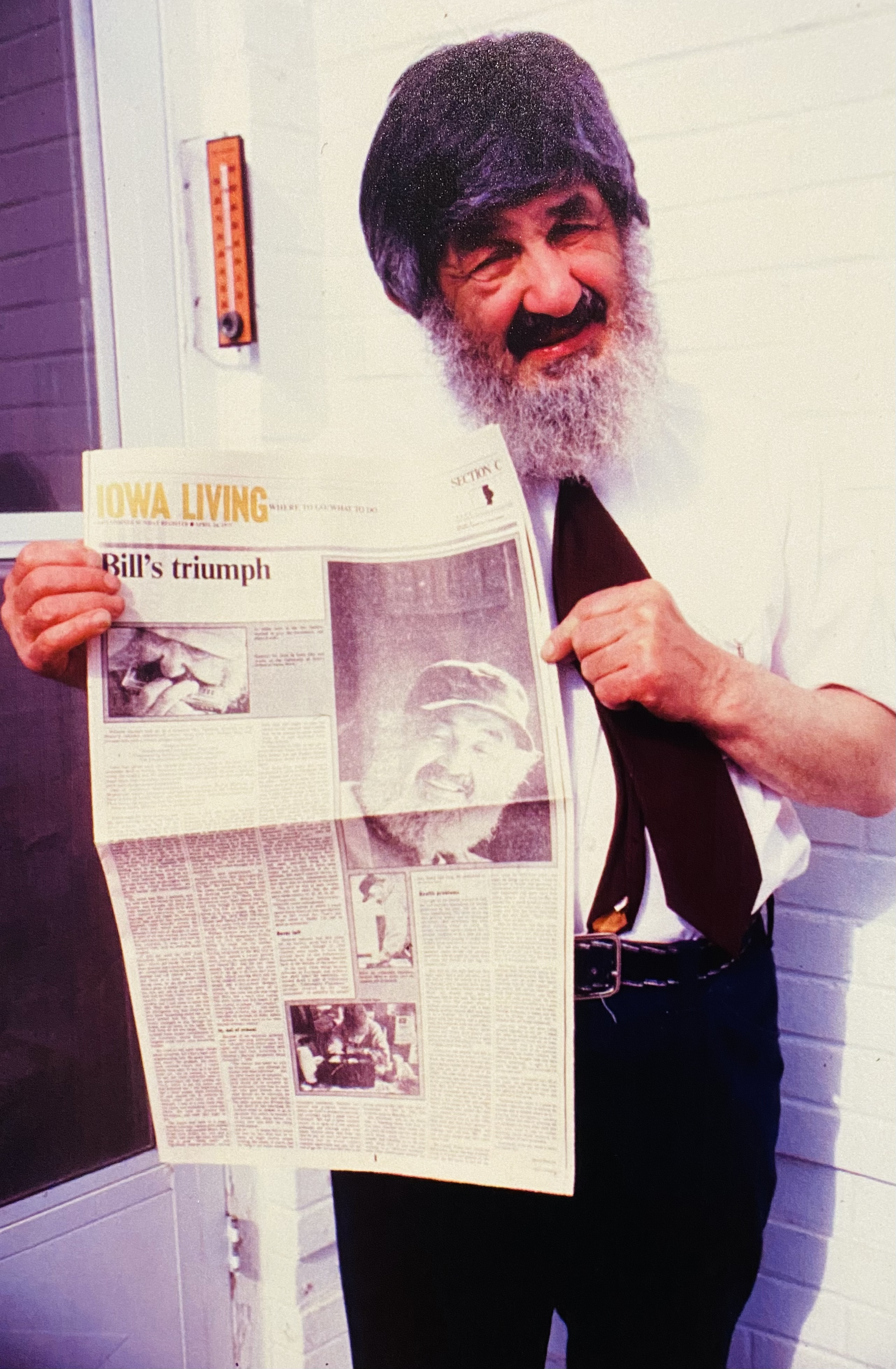
Knowing that 50-pages was way too much for the application, Morrow edited his paper into an abbreviated version, and according to Barry, gave it back to the students, and, literally, forgot about the whole thing. To this day, Morrow is still not certain how it all happened, but a few weeks later, he received word that, one: Bill had not won the University award, but, two: he had been chosen, instead, the State of Iowa’s Handicapped Iowan of The Year Award for 1976! So, in preparation for the big award ceremony in Des Moines on April 26, 1977, The Des Moines Register printed Barry’s abbreviated story – Bill’s Triumph.

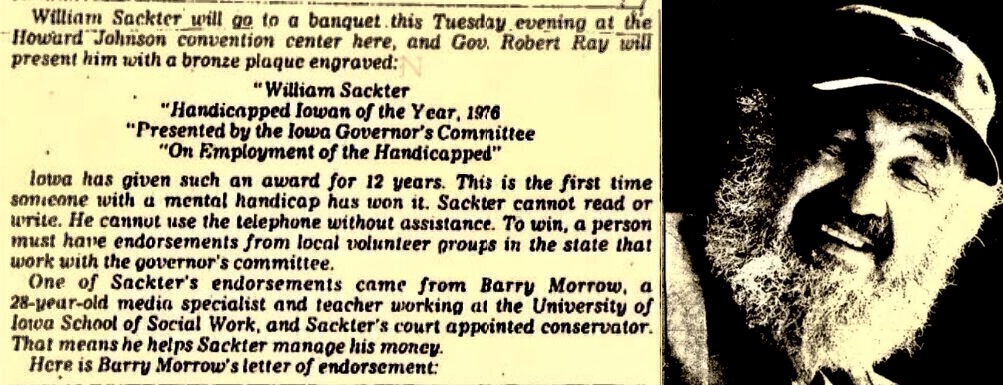
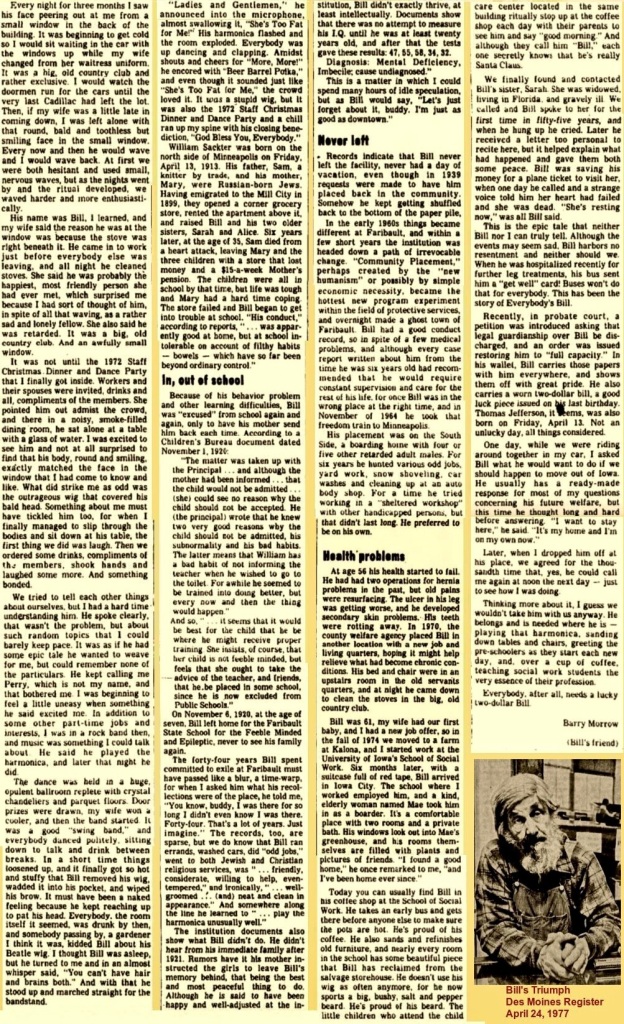
Barry Morrow and Bill Sackter – buddies for life. Below – Bill’s “lucky $2 bill” eventually became a cherished remembrance for Barry after Sackter died in 1983.
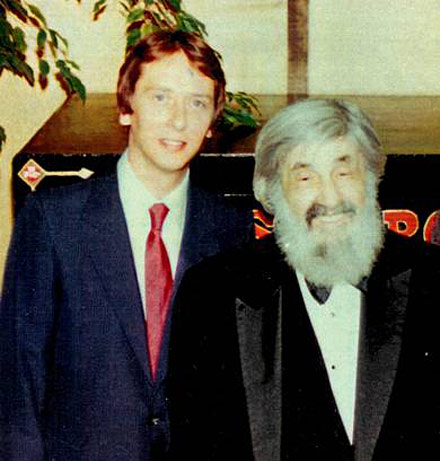
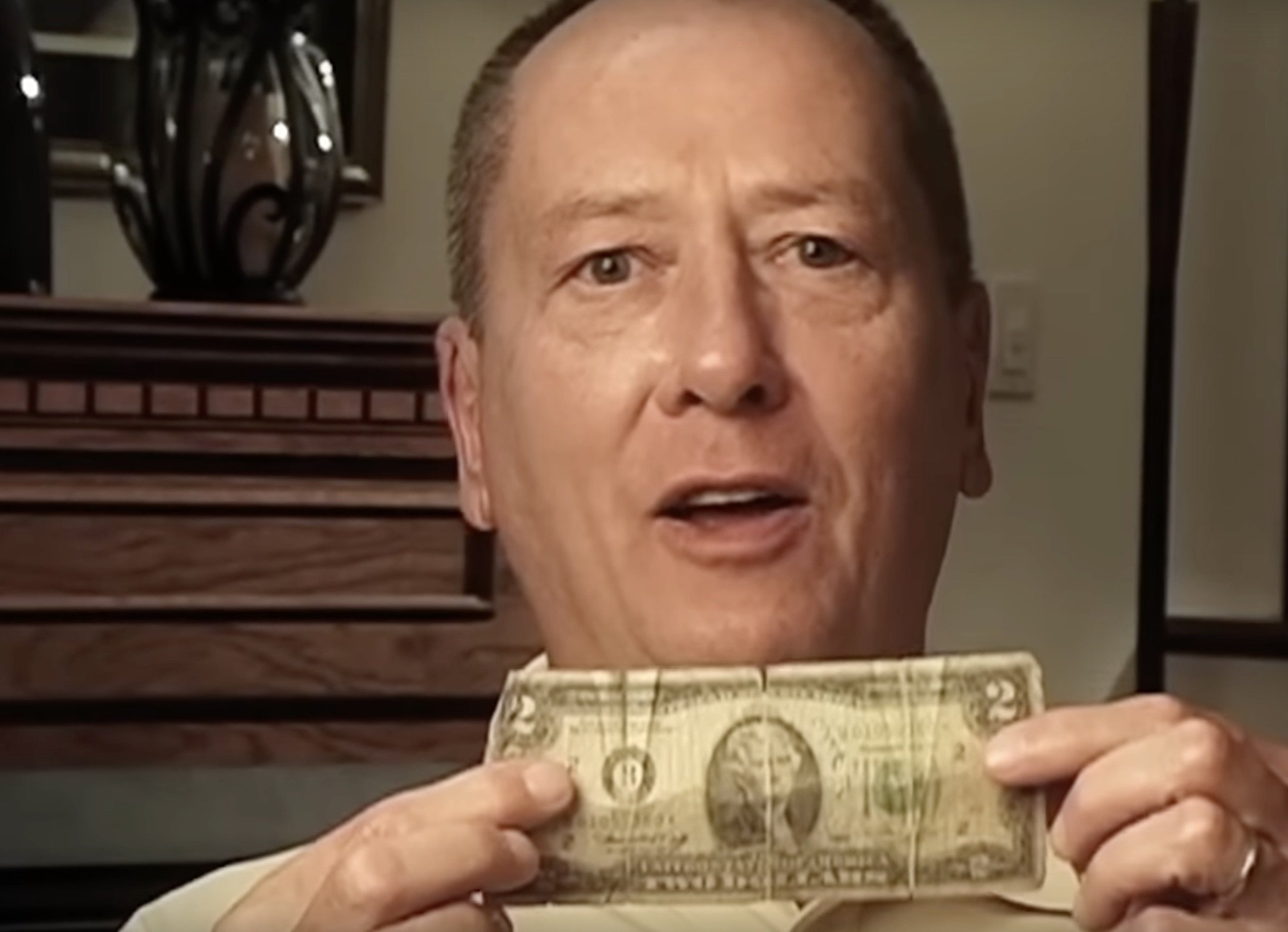

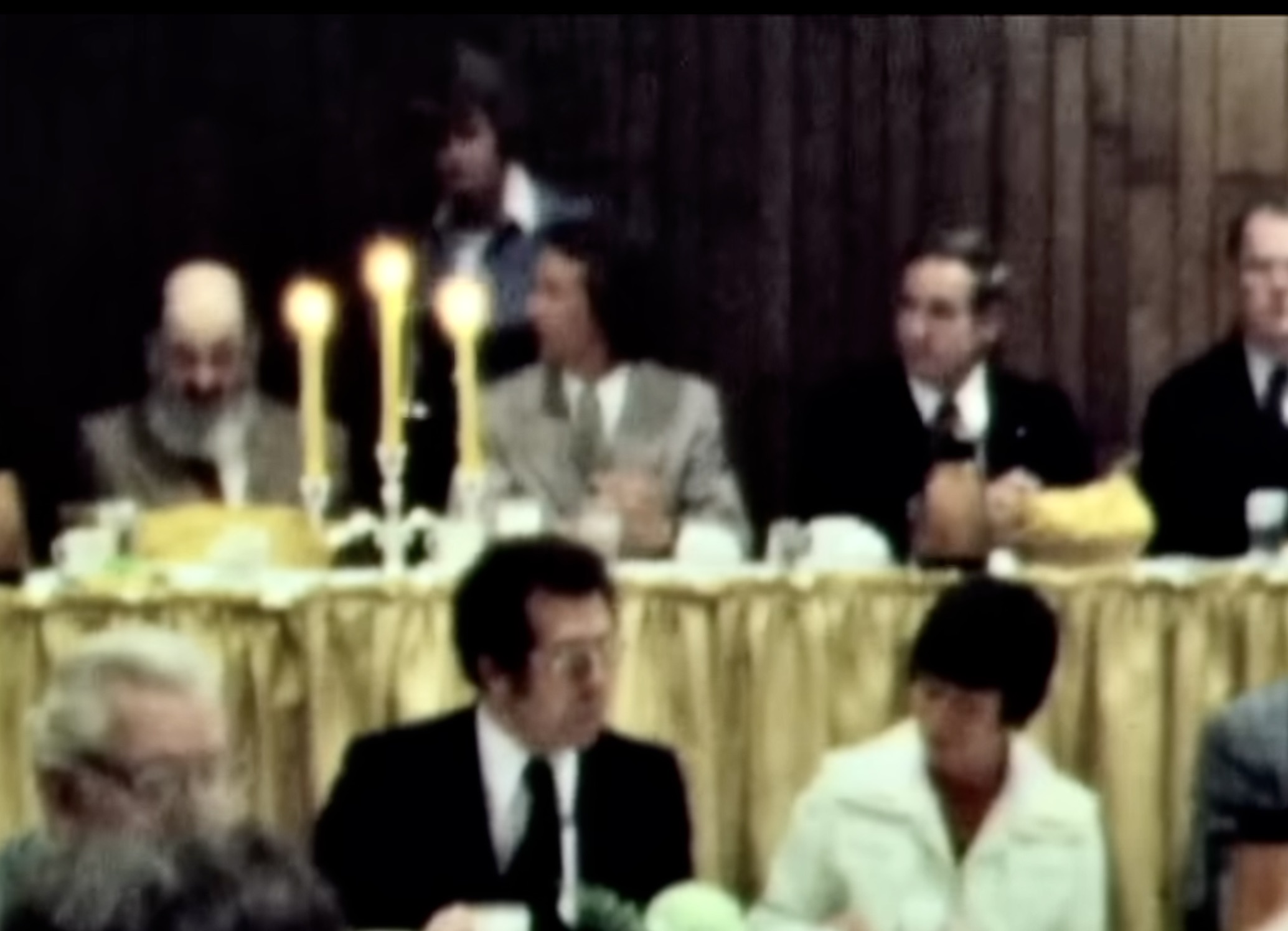
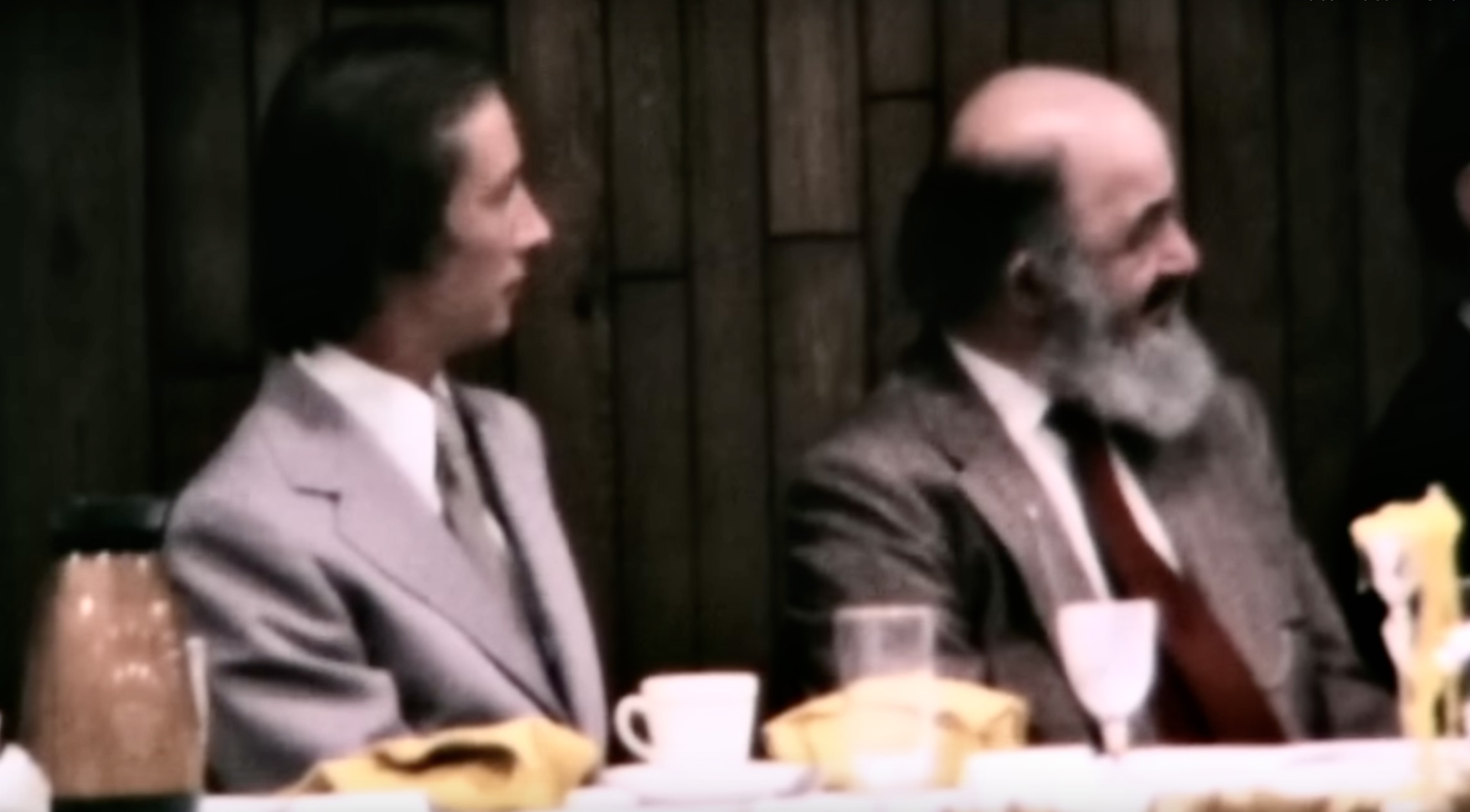
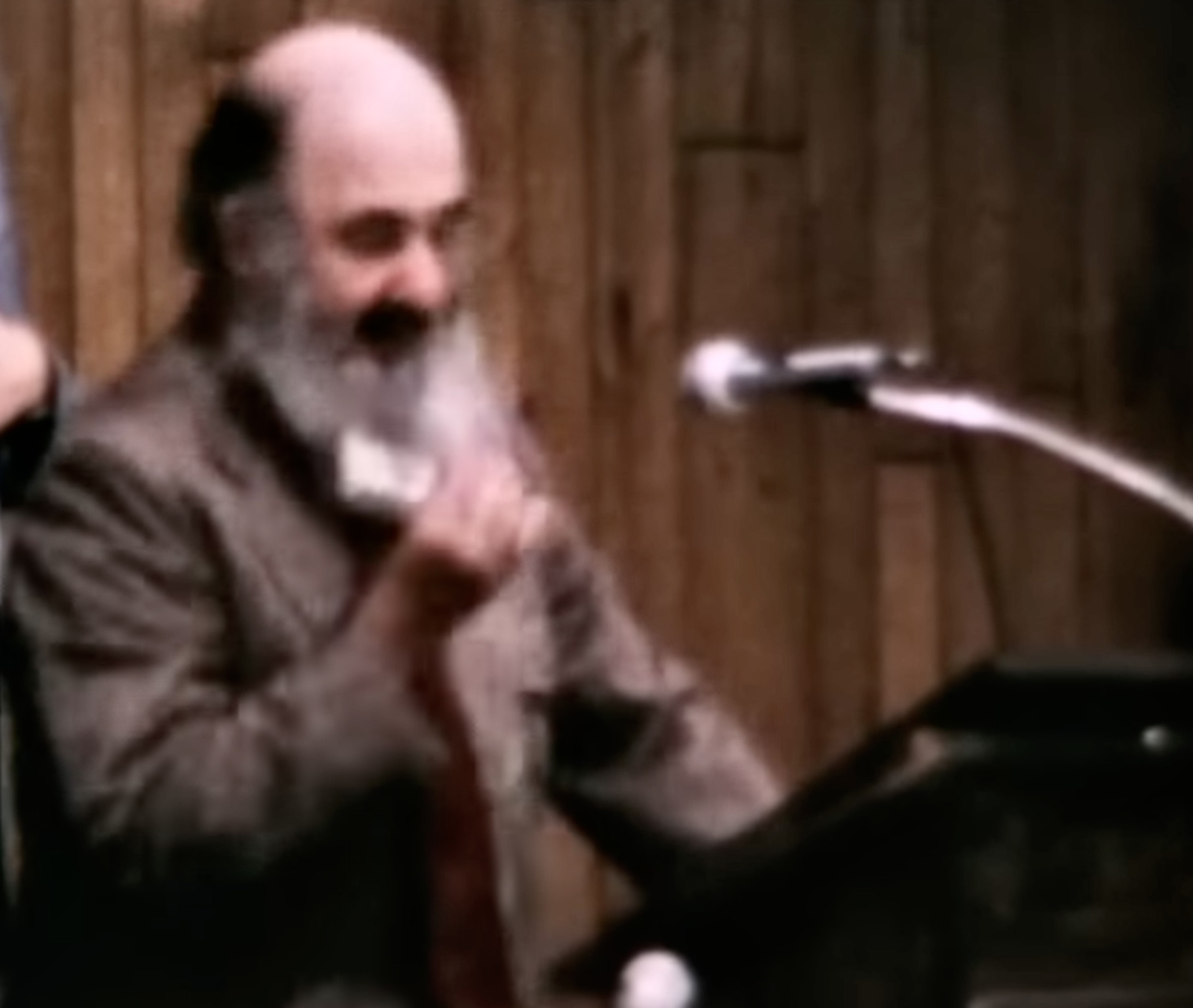
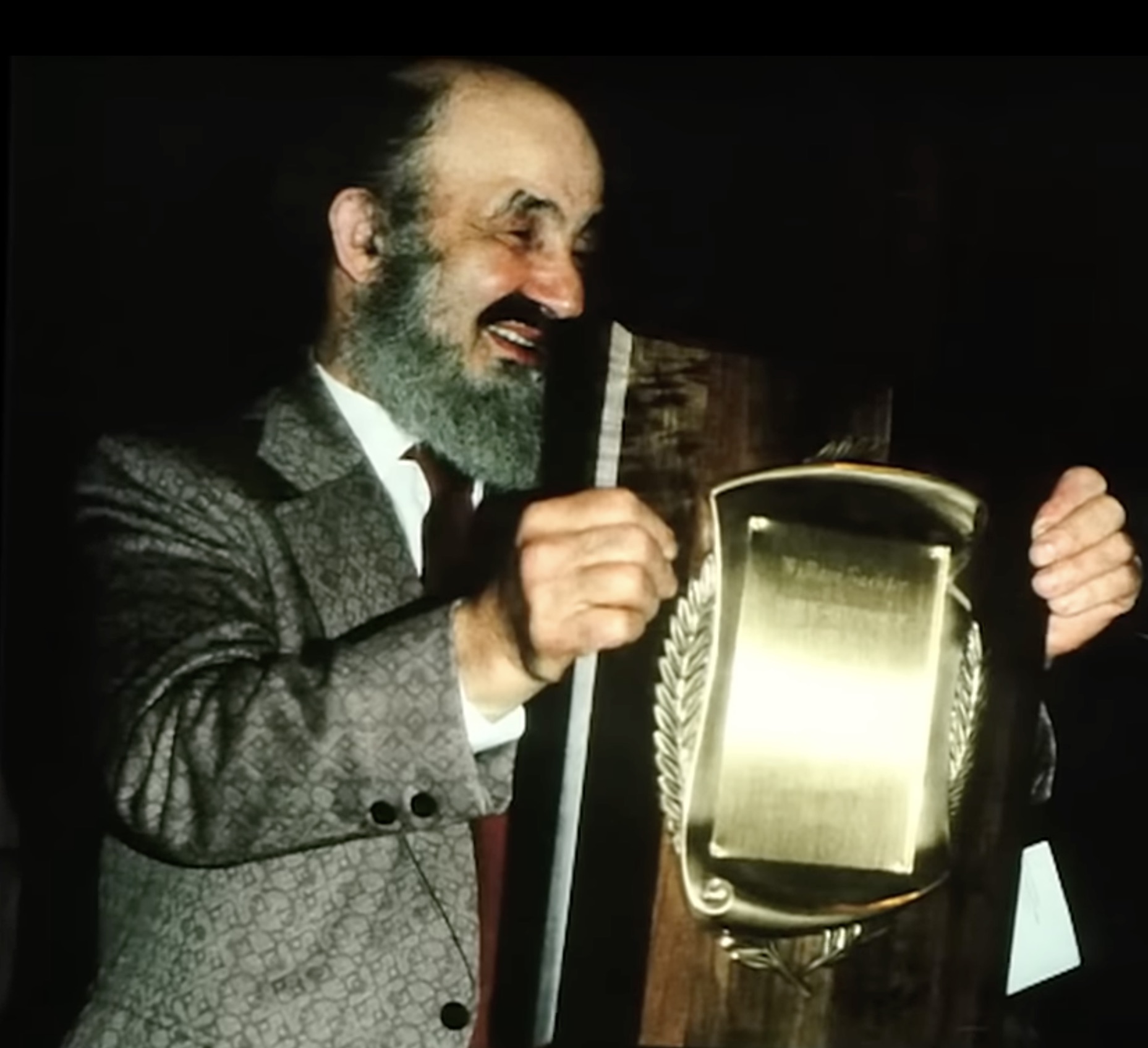
Iowa’s U.S. Senator John Culver was present – along with Governor Robert Ray (pictured below) – at the presentation of the award in Des Moines, and soon, Culver republished Barry’s Des Moines Register story about Bill Sackter in the Congressional Record.
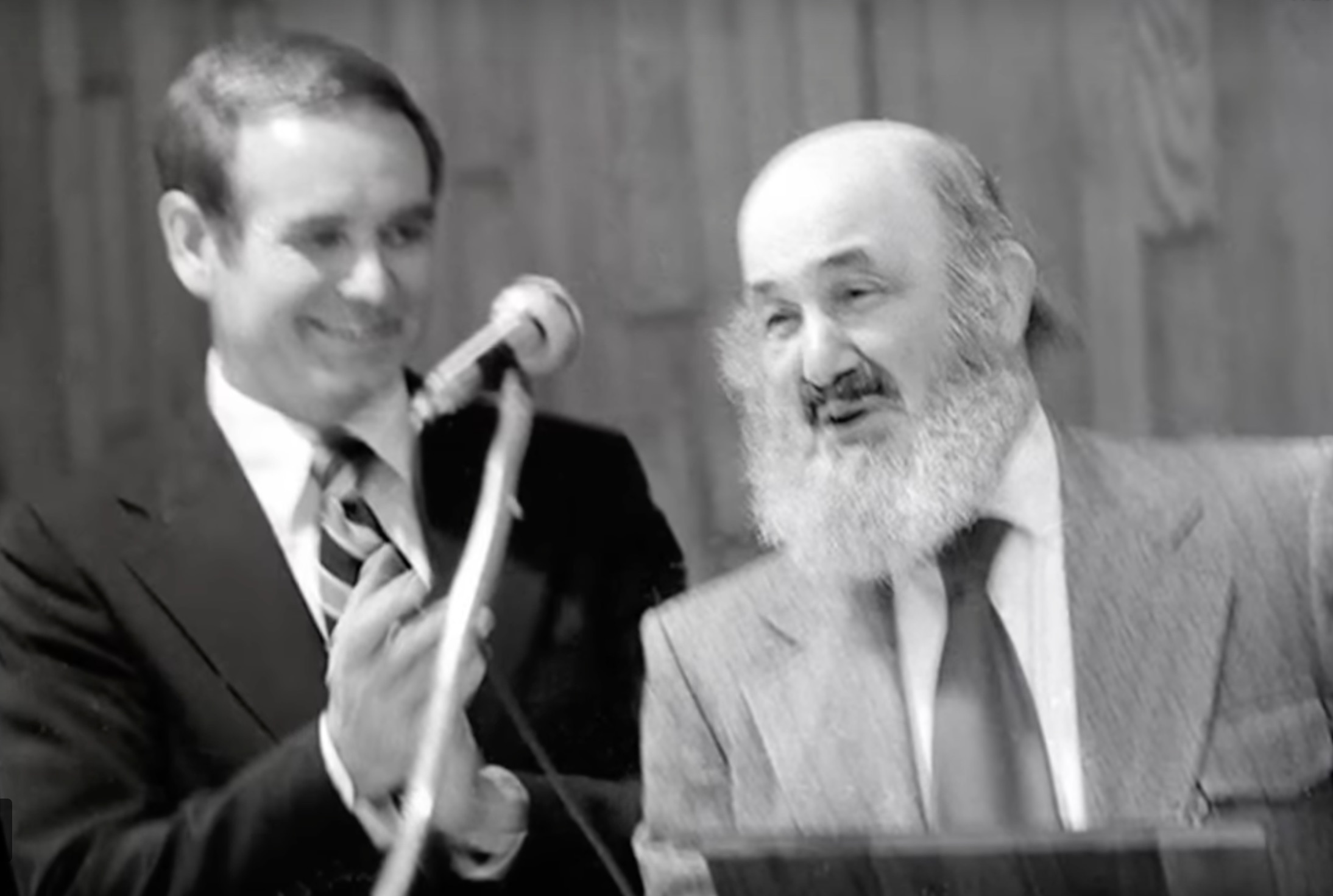
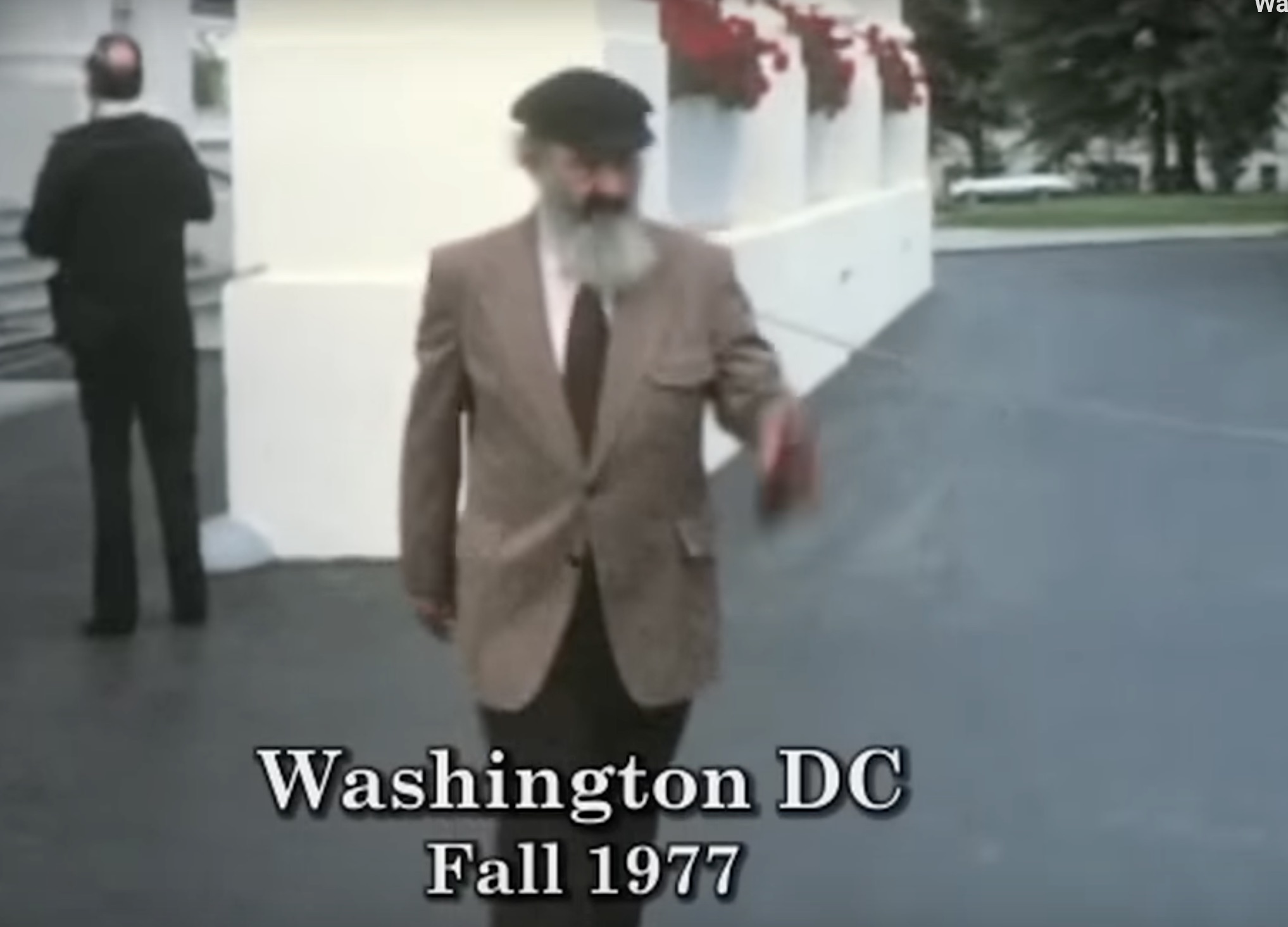
News spread far and wide, and by the fall of 1977, Bill was one of five finalists nominated for the National Handicapped Person of the Year Award. Barry and Bill attended the award ceremony at the White House that fall where they met both President Jimmy Carter and First Lady Rosalynn Carter.
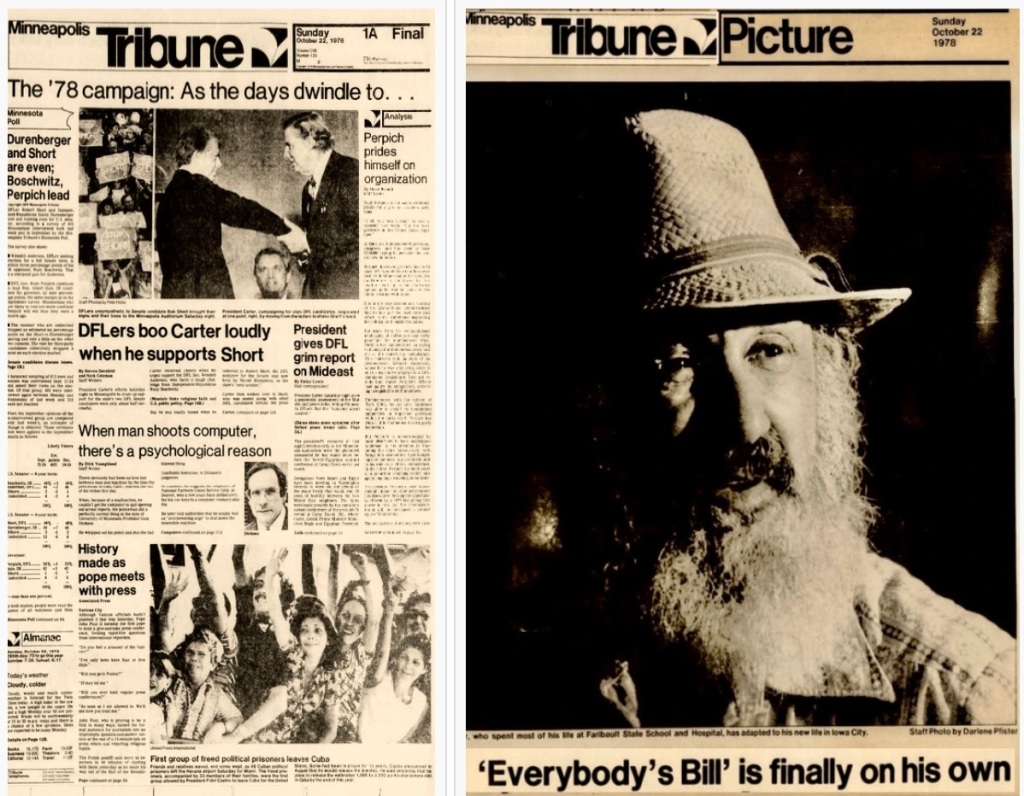

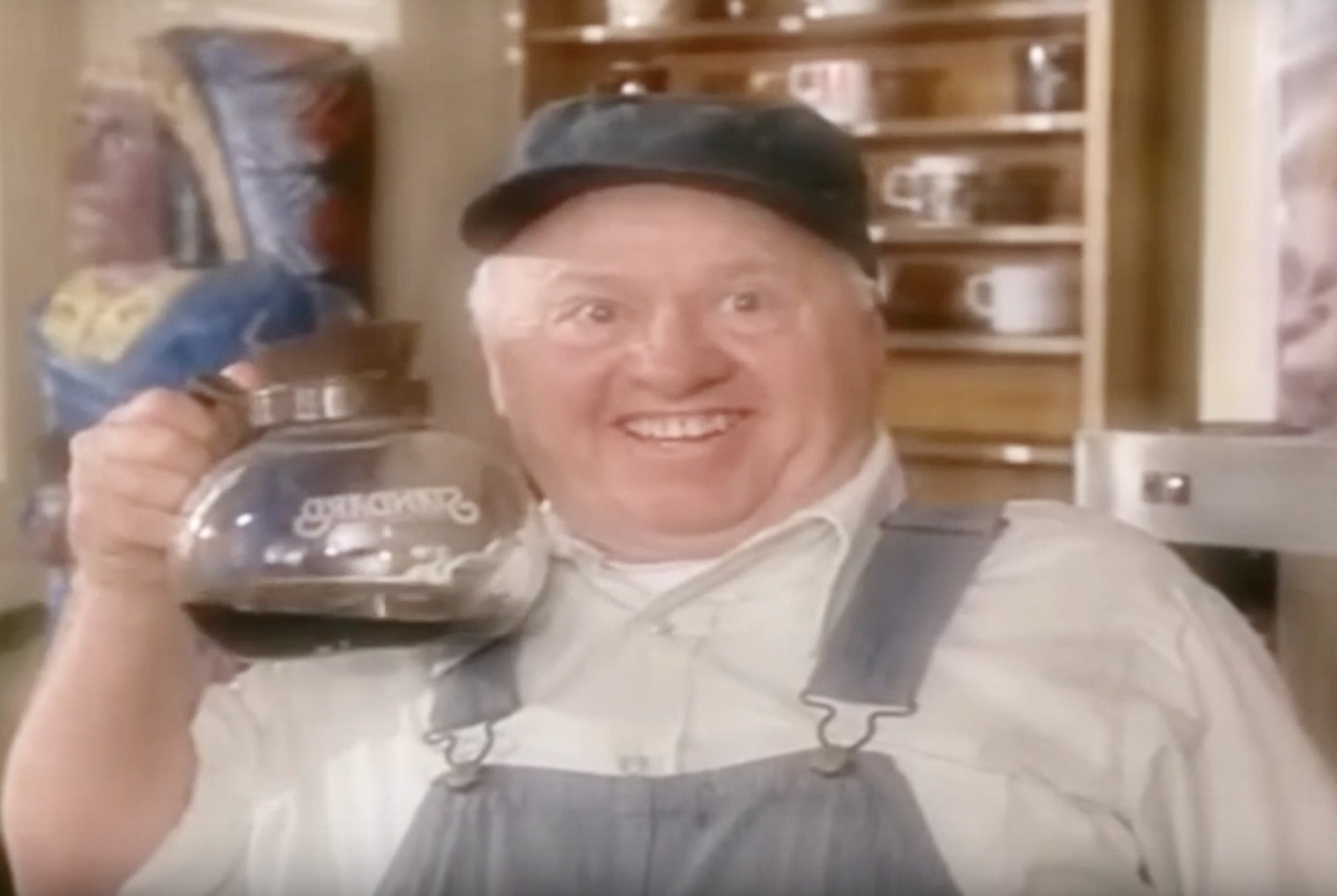
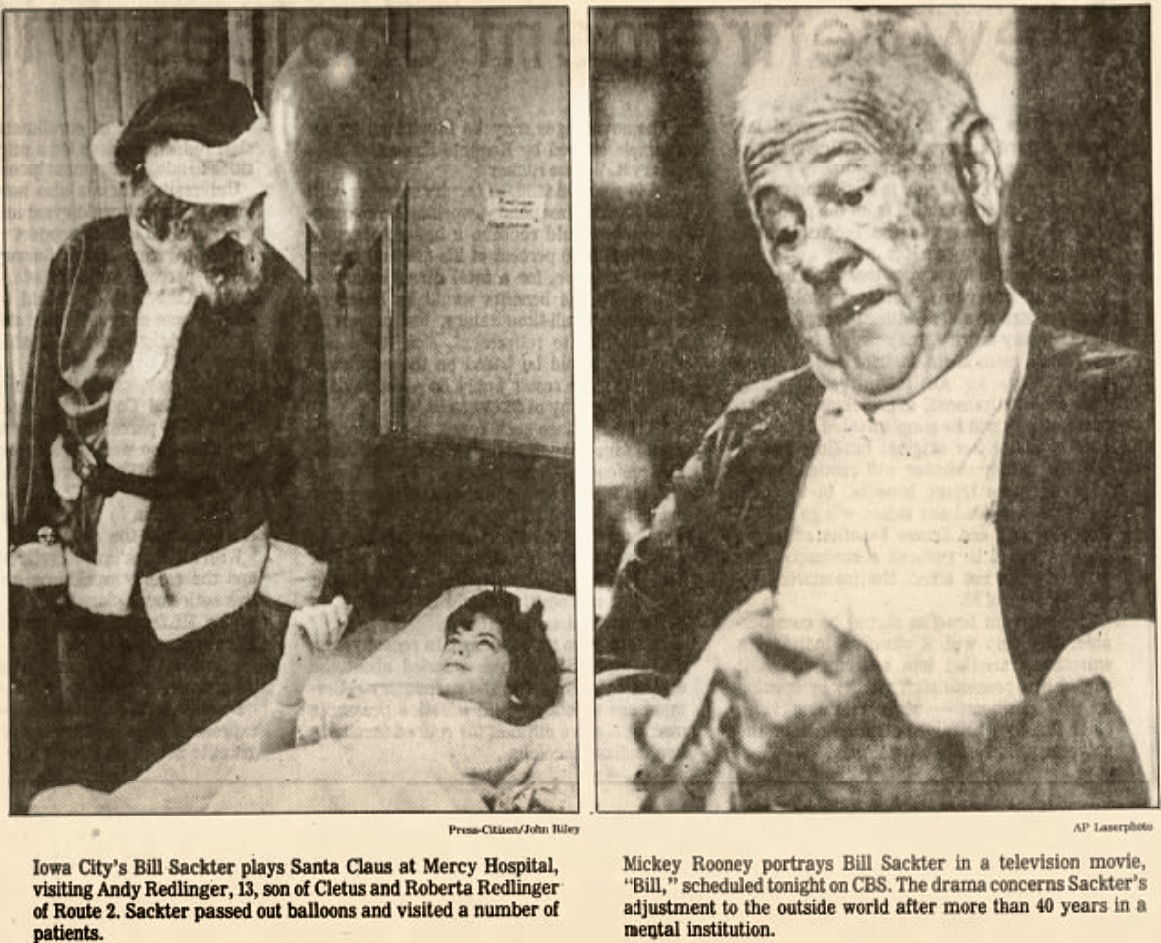
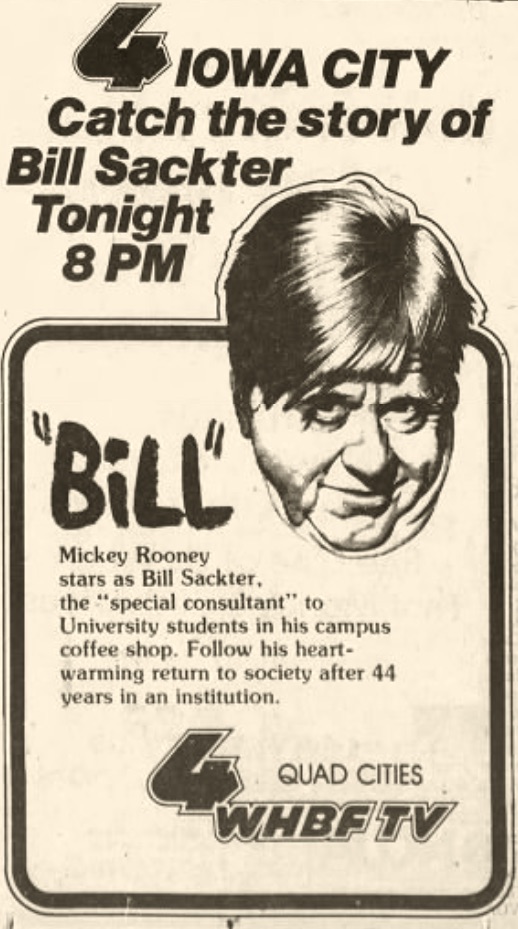
As we discuss in length on another post, in 1978, television executives from CBS contacted Morrow about making Bill’s Triumph into a TV movie – entitled simply – “Bill” – which aired in December 1981 starring Mickey Rooney as Bill and a young Dennis Quaid as Morrow. The show was a huge success, winning Rooney both an Emmy and a Golden Globe award, with Barry receiving an Emmy for the teleplay. In 1983, Morrow scripted a sequel, “Bill on His Own,” also starring Mickey Rooney, and Helen Hunt, which was well received as well.
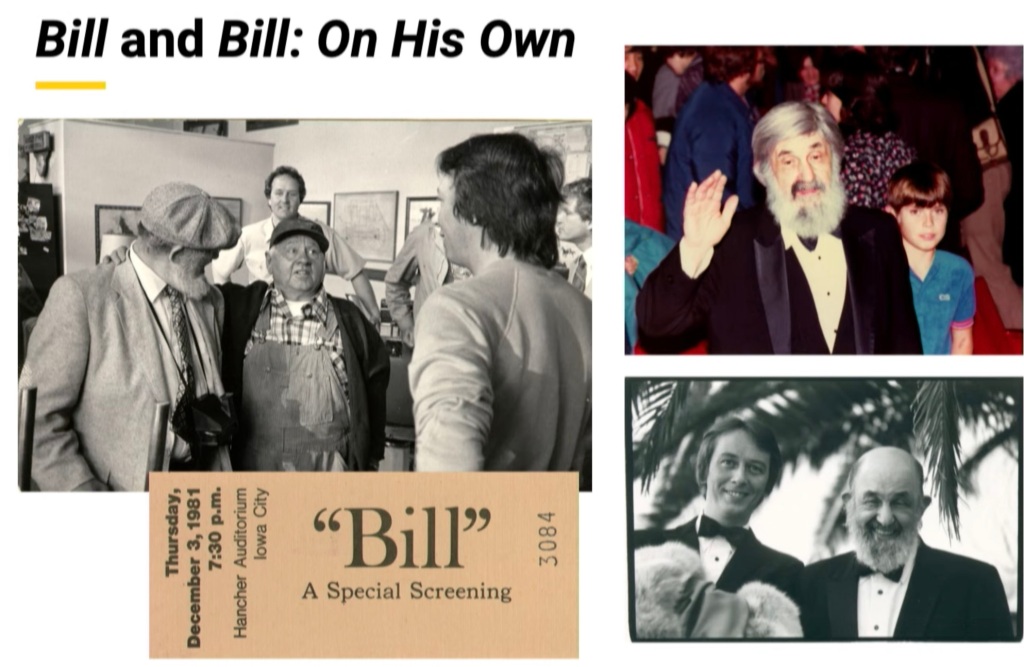

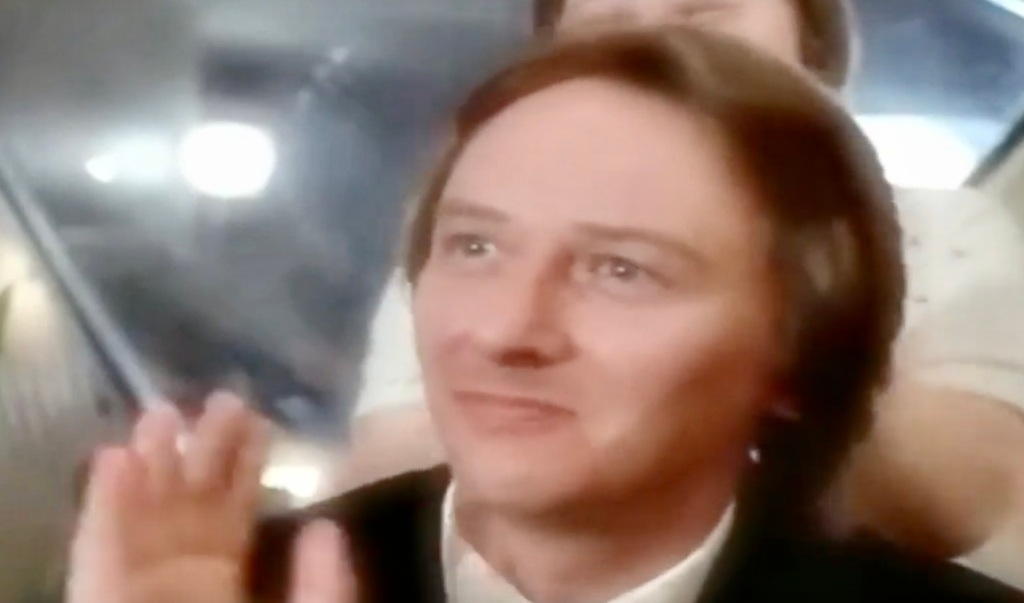
Because of the great success of the Bill Sackter story, Barry & Bev Morrow moved their family westward to California (1981) so Barry could pursue his newfound profession – playwright and scriptwriter. In the process, Barry also became an advocate for the developmentally disabled, serving on the board of the Association of Retarded Citizens (The ARC), and joining the National Association of Social Workers, and the Autism Society of America.

After Bill Sackter died, back in Iowa City, in June 1983, Morrow pledged to continue his activism, and at a convention of The ARC in 1984, he met Kim Peek, a rare megasavant – a person with an exceptional memory, but also severe social difficulties resulting from a developmental disability related to congenital brain abnormalities. As it turned out, Kim was the man on whom Morrow would later (1988) base the Dustin Hoffman character in his Academy-Award winning movie – “Rain Man.”
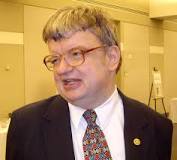
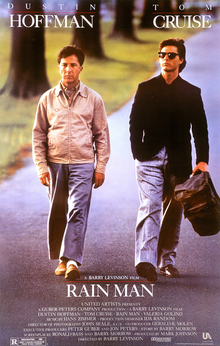
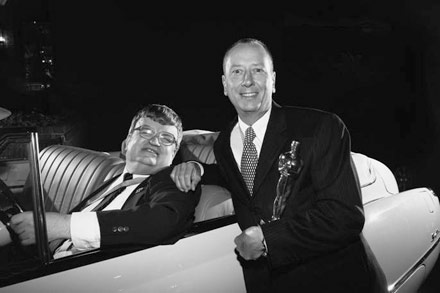
When Morrow accepted his Oscar for “Rain Man,” he handed it to Kim Peek, telling him to keep the statuette as long as he wished. As it turned out, Kim would cherish the Oscar for the rest of his life, keeping it close at hand, displaying it at the many onstage events at which he demonstrated his memory skills. After Peek’s death (2009), Morrow put his Oscar on permanent loan to the Utah Film Center, in memory of Kim Peek, putting forward the money for the Peek Award, which “pays tribute to artists, media makers, and film subjects who are positively impacting our society’s perception of people with disabilities”.
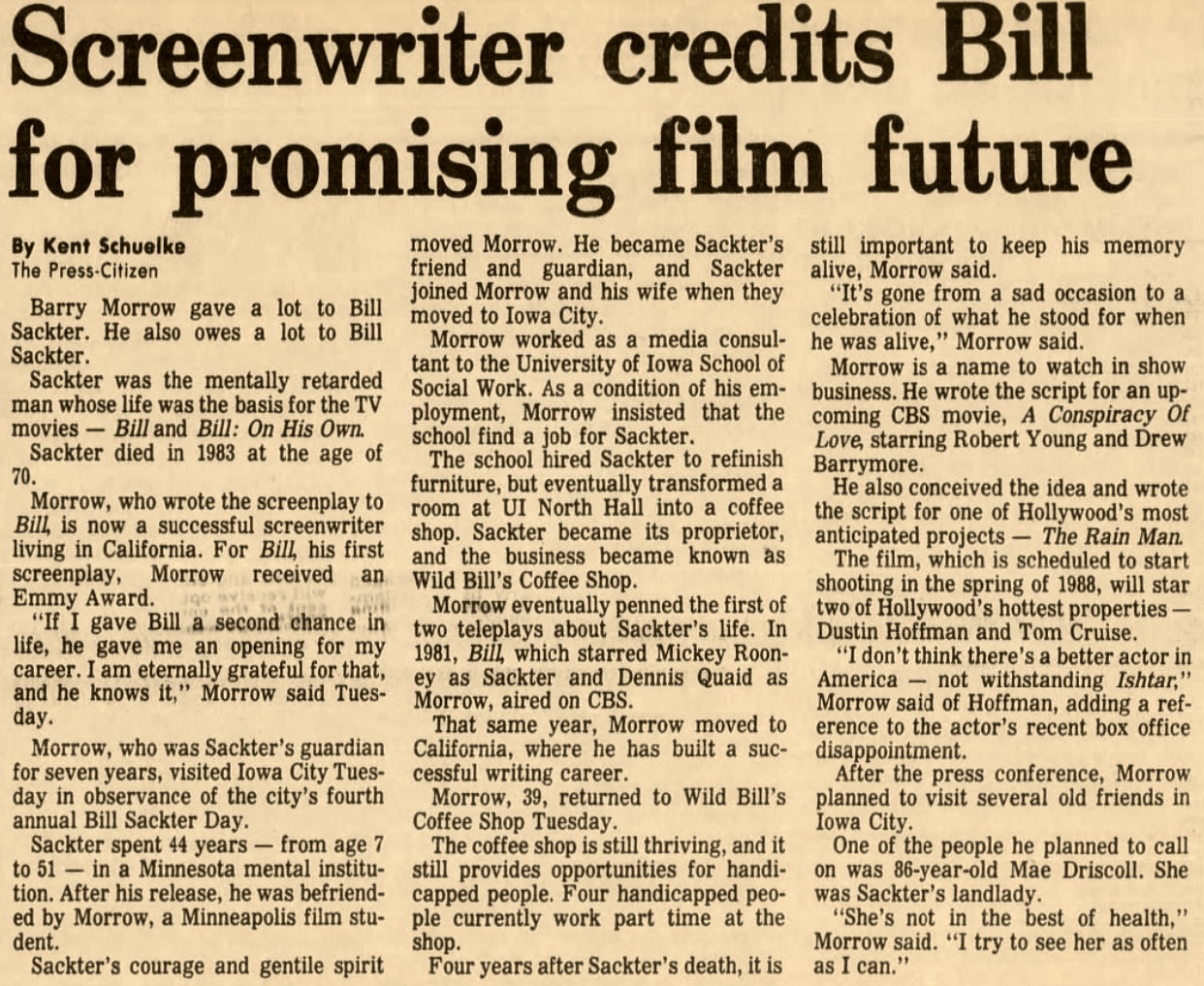
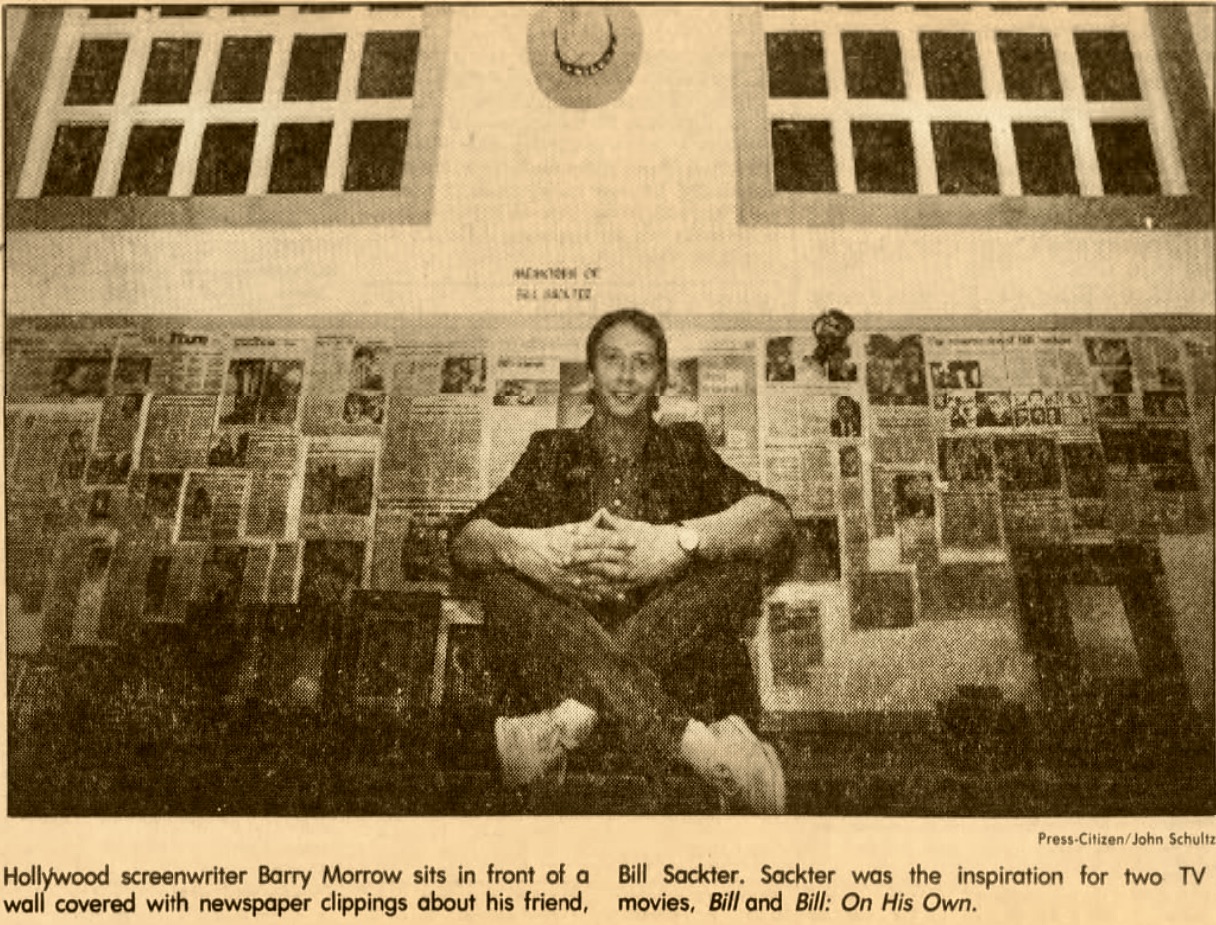
Barry Morrow returned to Iowa City in July 1987 to celebrate the 4th anniversary of Bill Sakter’s death. In this interview with The Press-Citizen, Morrow talks about how he got his start in screenwriting here in Iowa City. Two interesting notes here: 1) the article eludes to the upcoming (1988) release of the Dustin Hoffman movie – Rain Man! 2) Barry plans to visit Bill’s amazing landlady – the 86-year-old Mae Driscoll.

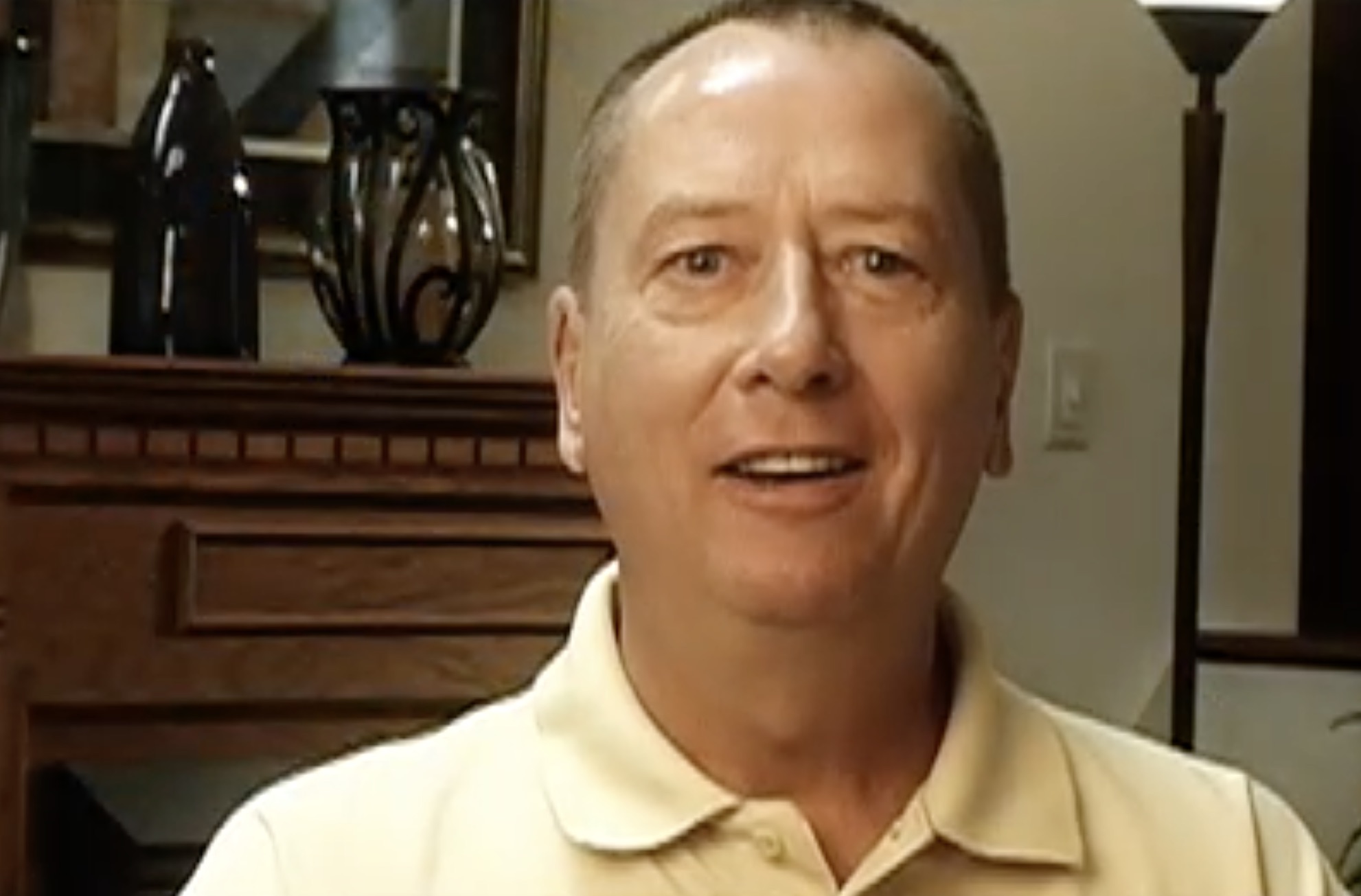
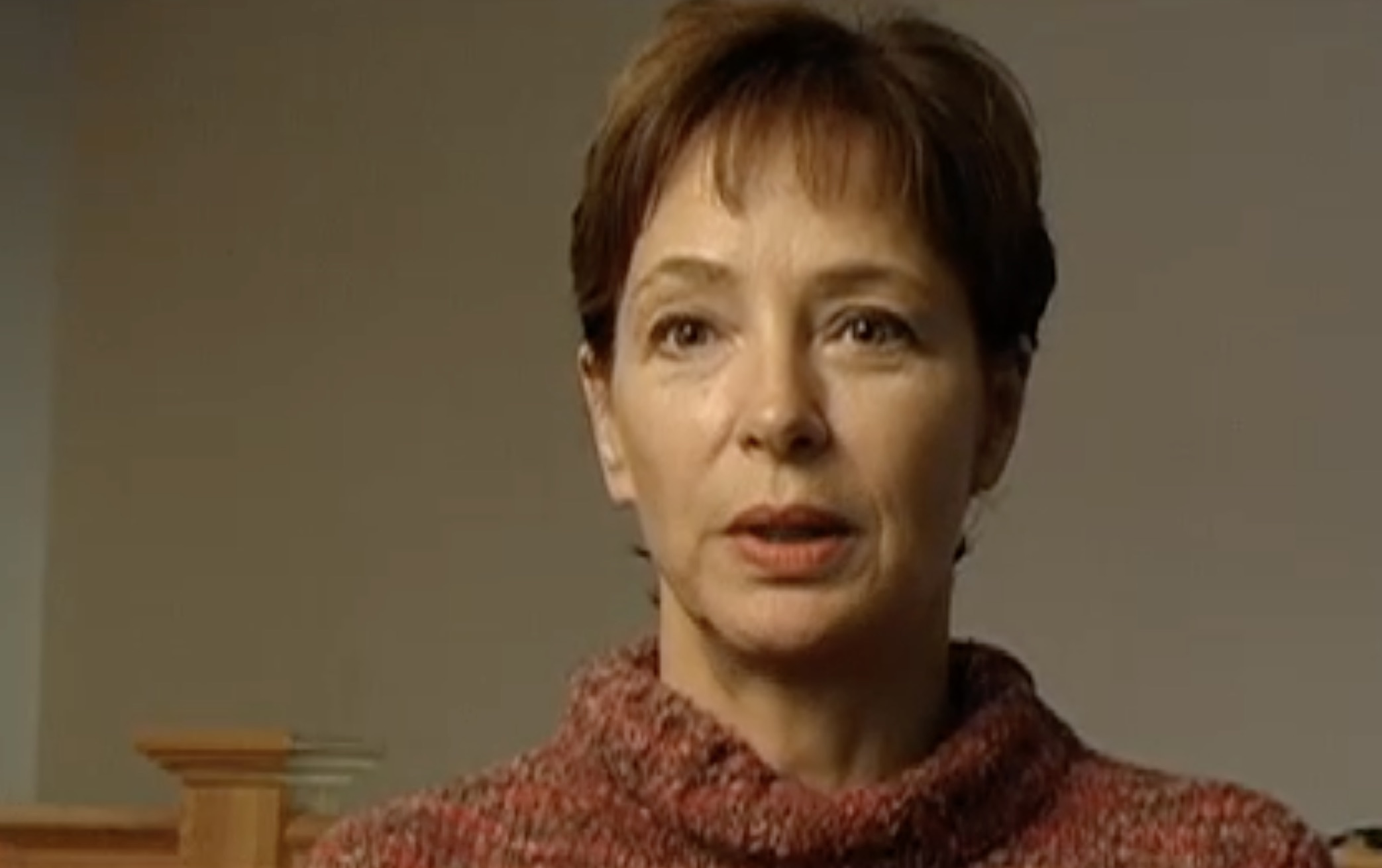
Today, Barry & Bev Morrow live in Santa Barbara, California. Their son, Clay, is a director of animation at Disney Studios, their daughter, Zoe, is a school teacher, and both live within an hour’s drive of their parents.
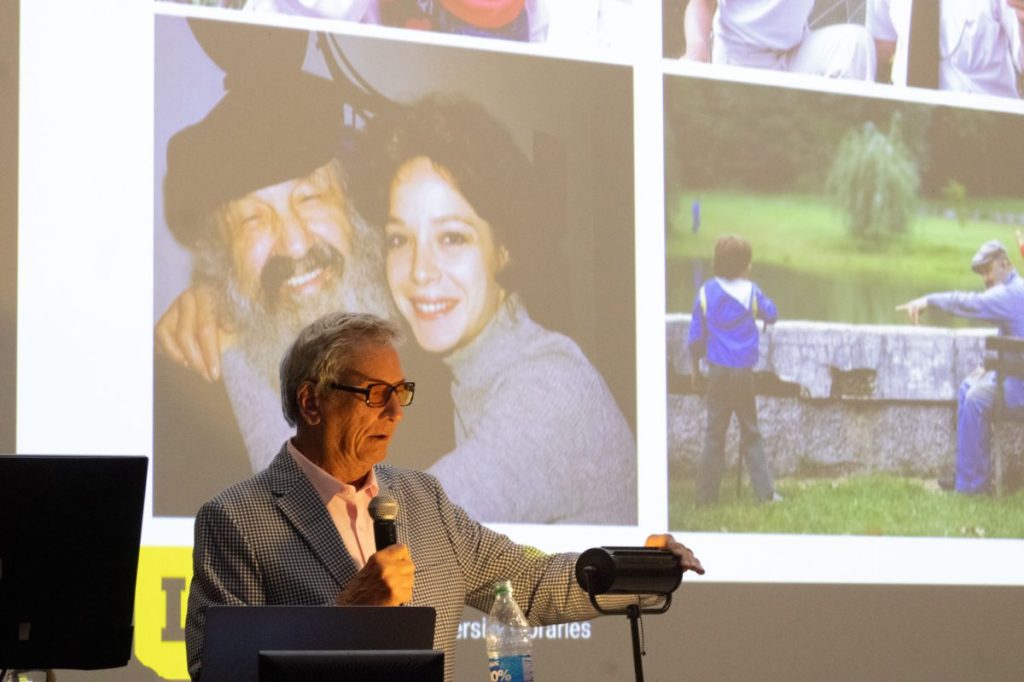
“I had no ambition to be a writer,” admits Morrow, who grew up the fourth child of six in a crowded home in St. Paul, Minnesota. “Being around all those kids, the way you got attention at the dinner table was telling a good story. I learned how to take a story and make it better.”
Looking back on his seven years in Iowa City (1974-81), Morrow views them with warmth. “We had some of the best times of our lives here,” he says. “We had no money. The kids were small. We lived on a farm with chickens. We didn’t have a TV. Those times were wonderful.”


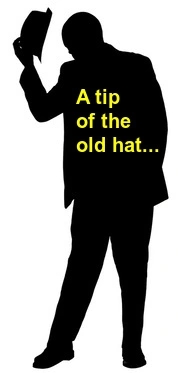

Kudos to the amazing resources below for the many quotes, photographs, etc. used on this page.
Bill’s Triumph, Des Moines Register, April 24, 1977, p 34
Bill Sackter – A Friend Indeed, billsackter,com
Screenwriter credits Bill for promising film future, Iowa City Press-Citizen, July 1, 1987, p 13
Click here to go on to the next section…
Click here for a complete INDEX of Our Iowa Heritage stories…

